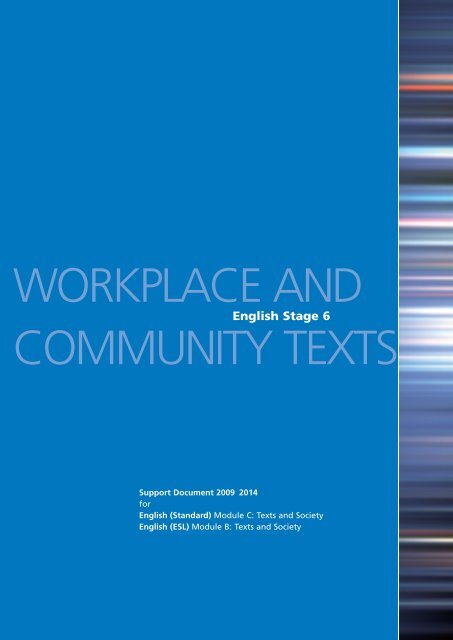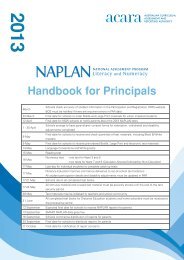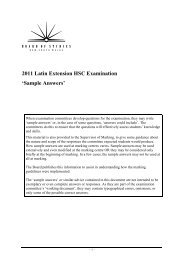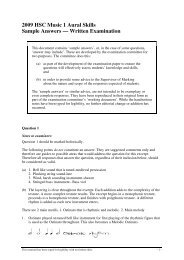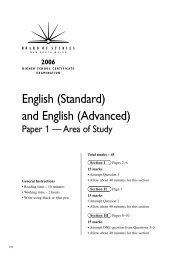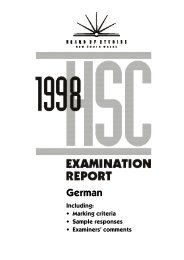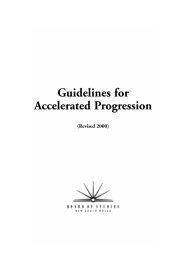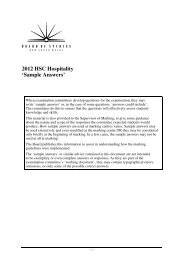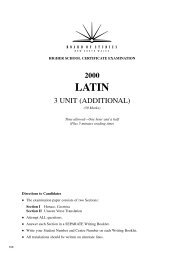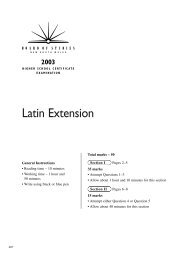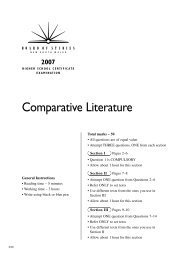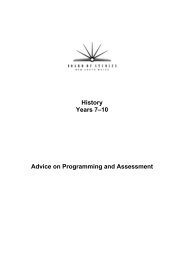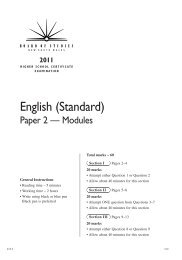Workplace and Community Texts English Stage 6 - Board of Studies ...
Workplace and Community Texts English Stage 6 - Board of Studies ...
Workplace and Community Texts English Stage 6 - Board of Studies ...
Create successful ePaper yourself
Turn your PDF publications into a flip-book with our unique Google optimized e-Paper software.
WORKPLACE AND<br />
COMMUNIT <strong>English</strong><br />
Y <strong>Stage</strong><br />
TE 6<br />
X TS<br />
Support Document 2009 – 2014<br />
for<br />
<strong>English</strong> (St<strong>and</strong>ard) Module C: <strong>Texts</strong> <strong>and</strong> Society<br />
<strong>English</strong> (ESL) Module B: <strong>Texts</strong> <strong>and</strong> Society
© 2007 Copyright <strong>Board</strong> <strong>of</strong> <strong>Studies</strong> NSW for <strong>and</strong> on behalf <strong>of</strong> the Crown in right <strong>of</strong> the State <strong>of</strong> New South Wales.<br />
This document contains Material prepared by the <strong>Board</strong> <strong>of</strong> <strong>Studies</strong> NSW for <strong>and</strong> on behalf <strong>of</strong> the State <strong>of</strong> New<br />
South Wales. The Material is protected by Crown copyright.<br />
All rights reserved. No part <strong>of</strong> the Material may be reproduced in Australia or in any other country by any process,<br />
electronic or otherwise, in any material form or transmitted to any other person or stored electronically in any<br />
form without the prior written permission <strong>of</strong> the <strong>Board</strong> <strong>of</strong> <strong>Studies</strong> NSW, except as permitted by the Copyright Act<br />
1968. School students in NSW <strong>and</strong> teachers in schools in NSW may copy reasonable portions <strong>of</strong> the Material for<br />
the purposes <strong>of</strong> bona fide research or study. Teachers in schools in NSW may make multiple copies, where<br />
appropriate, <strong>of</strong> sections <strong>of</strong> the HSC papers for classroom use under the provisions <strong>of</strong> the school’s Copyright<br />
Agency Limited (CAL) licence.<br />
When you access the Material you agree:<br />
• to use the Material for information purposes only<br />
• to reproduce a single copy for personal bona fide study use only <strong>and</strong> not to reproduce any major extract or<br />
the entire Material without the prior permission <strong>of</strong> the <strong>Board</strong> <strong>of</strong> <strong>Studies</strong> NSW<br />
• to acknowledge that the Material is provided by the <strong>Board</strong> <strong>of</strong> <strong>Studies</strong> NSW<br />
• not to make any charge for providing the Material or any part <strong>of</strong> the Material to another person or in any<br />
way make commercial use <strong>of</strong> the Material without the prior written consent <strong>of</strong> the <strong>Board</strong> <strong>of</strong> <strong>Studies</strong> NSW <strong>and</strong><br />
payment <strong>of</strong> the appropriate copyright fee<br />
• to include this copyright notice in any copy made<br />
• not to modify the Material or any part <strong>of</strong> the Material without the express prior written permission <strong>of</strong> the<br />
<strong>Board</strong> <strong>of</strong> <strong>Studies</strong> NSW.<br />
The Material may contain third party copyright materials such as photos, diagrams, quotations, cartoons <strong>and</strong><br />
artworks. These materials are protected by Australian <strong>and</strong> international copyright laws <strong>and</strong> may not be<br />
reproduced or transmitted in any format without the copyright owner’s specific permission. Unauthorised<br />
reproduction, transmission or commercial use <strong>of</strong> such copyright materials may result in prosecution.<br />
The <strong>Board</strong> <strong>of</strong> <strong>Studies</strong> has made all reasonable attempts to locate owners <strong>of</strong> third party copyright material <strong>and</strong><br />
invites anyone from whom permission has not been sought to contact the Copyright Officer, tel (02) 9367 8289,<br />
fax (02) 9279 1482.<br />
Published by<br />
<strong>Board</strong> <strong>of</strong> <strong>Studies</strong> NSW<br />
GPO Box 5300<br />
Sydney NSW 2001<br />
Australia<br />
Tel: (02) 9367 8111<br />
Fax: (02) 9367 8484<br />
Internet: www.board<strong>of</strong>studies.nsw.edu.au<br />
October 2007<br />
January 2011<br />
ISBN 978 174147 9232<br />
2007116<br />
2010922<br />
20120938
WORKPLACE AND COMMUNITY TEXTS<br />
CONTENTS<br />
Introduction ...................................................................................................................4<br />
Website Links ..............................................................................................................6<br />
Working Lives<br />
Writing Casual Job Applications – University <strong>of</strong> Sydney Casual<br />
Employment Service....................................................................................................9<br />
Applying for a job – step by step: Job Advertisement ...............................................12<br />
Curriculum Vitae .................................................13<br />
Addressing the Selection Criteria..........................14<br />
Poster: Common <strong>Workplace</strong> Animals – Anti-Discrimination<br />
<strong>Board</strong> <strong>of</strong> NSW...........................................................................................................17<br />
Brochure: How to deal with discrimination, unfair treatment or harassment –<br />
Anti-Discrimination <strong>Board</strong> <strong>of</strong> NSW ............................................................................18<br />
Brochure: Safety at Work: A Guide for Young Workers in Hospitality –<br />
WorkCover NSW .......................................................................................................20<br />
Statutory Declaration form – Commonwealth <strong>of</strong> Australia ........................................24<br />
<strong>Community</strong> Living<br />
Feature article: P-platers put on right road – The Age ..............................................26<br />
Editorial: On road to education – Illawarra Mercury ................................................29<br />
Brochure: Lucky winner or gullible victim? Ways to spot a scam –<br />
NSW Office Of Fair Trading ......................................................................................30<br />
Brochure: Safe Party Pack – NSW Police ..................................................................32<br />
Advertisement: Room in your heart for more than one foster child? – Centacare....37<br />
Conference presentation: <strong>Community</strong> Idol – Sanctuary Refugee Foundation ............38<br />
Having a Voice<br />
Entry Form: Frustrated Writers’ Mentoring Program – Children’s<br />
Book Council.............................................................................................................44<br />
Letter to the Editor: Unfriendly modern mobiles – The Australian...........................46<br />
Radio Transcript: ‘Britain Falls for Kath <strong>and</strong> Kim’ – ABC AM...................................47<br />
Online TV Guide: Choir <strong>of</strong> Hard Knocks – ABC TV...................................................49<br />
Opinion: Raw exposure <strong>and</strong> epiphany in paradise –<br />
Sydney Morning Herald.............................................................................................50<br />
Travel blog: Backpacker – The working holiday –<br />
Sydney Morning Herald Online..................................................................................52<br />
Cartoon: Why would anyone want a blog? – Cincinnati Enquirer.............................56
WORKPLACE AND COMMUNITY TEXTS<br />
Introduction<br />
Introduction<br />
<strong>Workplace</strong> <strong>and</strong> <strong>Community</strong> <strong>Texts</strong> will help teachers in the delivery <strong>of</strong> the following:<br />
■ In the <strong>English</strong> (St<strong>and</strong>ard) course, all electives in Module C, <strong>Texts</strong> in Society;<br />
■ In the <strong>English</strong> (ESL) course, in Module B, <strong>Texts</strong> in Society, Elective 1: Living <strong>and</strong><br />
Working in the <strong>Community</strong>.<br />
The materials are examples <strong>of</strong> different kinds <strong>of</strong> texts used in the workplace <strong>and</strong> in the<br />
community. All examples are from real life.<br />
In the <strong>English</strong> (St<strong>and</strong>ard) course, <strong>Workplace</strong> <strong>and</strong> <strong>Community</strong> <strong>Texts</strong> complements the<br />
study <strong>of</strong> the prescribed text in all Module C electives. The texts in this collection can be<br />
adapted to the situation that is being explored in the electives within the module:<br />
‘This module requires students to explore <strong>and</strong> analyse texts used in a specific situation. It<br />
assists students’ underst<strong>and</strong>ing <strong>of</strong> the ways that texts communicate information, ideas,<br />
bodies <strong>of</strong> knowledge, attitudes <strong>and</strong> belief systems in ways particular to specific areas <strong>of</strong><br />
society…<br />
Students explore the role <strong>of</strong> textual features in the shaping <strong>of</strong> meaning in specific contexts.<br />
They develop the communication skills necessary for a wide variety <strong>of</strong> personal, social,<br />
historical, cultural <strong>and</strong> workplace contexts. Composition focuses on analysing <strong>and</strong><br />
experimenting with textual forms characteristic <strong>of</strong> the specific contexts. These compositions<br />
may be realised in a variety <strong>of</strong> forms <strong>and</strong> media.’ (<strong>English</strong> <strong>Stage</strong> 6 Syllabus, p.33)<br />
In the <strong>English</strong> (ESL) course, <strong>Workplace</strong> <strong>and</strong> <strong>Community</strong> <strong>Texts</strong> provides the basis for<br />
further exploration within the elective <strong>of</strong> a range <strong>of</strong> texts that are used in the workplace<br />
<strong>and</strong> the community:<br />
‘In this elective students explore the kinds <strong>of</strong> texts that are widely used in the workplace <strong>and</strong><br />
the community. They respond to <strong>and</strong> compose texts appropriate to specific situations<br />
designed to meet students’ needs <strong>and</strong> interests. They consider what these texts imply about<br />
the nature <strong>of</strong> the workplace or the community in which they are used.<br />
Students are required to read <strong>and</strong> respond to a range <strong>of</strong> types <strong>of</strong> texts, including: job<br />
advertisements; applications <strong>and</strong> other forms; information brochures <strong>and</strong> technical manuals;<br />
news reports <strong>and</strong> editorials; feature articles; advertisements; web pages; speeches <strong>and</strong><br />
interviews; <strong>and</strong> other relevant texts. They are required to compose a range <strong>of</strong> types <strong>of</strong> texts,<br />
including: job application letters <strong>and</strong> personal résumés; work <strong>and</strong> accident reports; letters to<br />
the editor; letters <strong>of</strong> complaint, appreciation <strong>and</strong> request; advertisements <strong>and</strong> information<br />
brochures; feature articles; web pages; speeches <strong>and</strong> interviews; <strong>and</strong> other relevant texts.<br />
Students are also required to identify <strong>and</strong> explain the purposes <strong>and</strong> language techniques used<br />
in these types <strong>of</strong> texts.’ (<strong>English</strong> <strong>Stage</strong> 6 Prescriptions, p.28)<br />
Students examine the language forms <strong>and</strong> features <strong>and</strong> the structures <strong>of</strong> these texts,<br />
<strong>and</strong> reflect on the appropriateness <strong>of</strong> each text to its contexts.<br />
<strong>Workplace</strong> <strong>and</strong> <strong>Community</strong> <strong>Texts</strong> is not a prescribed document for any <strong>of</strong> the HSC<br />
<strong>English</strong> examinations. Students are not required to study any <strong>of</strong> the texts in this<br />
document in preparation for the HSC examination, nor are they required to refer to<br />
any <strong>of</strong> these texts in the HSC <strong>English</strong> examination.<br />
4 <strong>Board</strong> <strong>of</strong> <strong>Studies</strong> NSW <strong>English</strong> <strong>Stage</strong> 6 Support Document 2009–2014
WORKPLACE AND COMMUNITY TEXTS<br />
Some important points about this document<br />
Introduction<br />
These texts should be used as a stimulus for classroom teaching <strong>and</strong> learning. They are<br />
not intended to be used in isolation, but should augment local resources <strong>and</strong> materials<br />
collected by the teacher <strong>and</strong> students to meet their needs <strong>and</strong> interests. Suitable<br />
resources can be collected from workplaces, public agencies <strong>and</strong> the internet.<br />
The texts have been chosen to assist students to develop:<br />
■ skills in communicating in community <strong>and</strong> workplace contexts;<br />
■ competence in their transactions with organisations <strong>and</strong> systems.<br />
They are grouped under headings that relate to a particular aspect <strong>of</strong> living <strong>and</strong><br />
working in the community. Teachers should design activities to engage students in an<br />
exploration <strong>of</strong> these <strong>and</strong> other texts. All activities should relate to the relevant module<br />
as outlined in the <strong>Stage</strong> 6 <strong>English</strong> syllabus.<br />
<strong>Board</strong> <strong>of</strong> <strong>Studies</strong> NSW <strong>English</strong> <strong>Stage</strong> 6 Support Document 2009–2014 5
WORKPLACE AND COMMUNITY TEXTS<br />
6<br />
Website Links<br />
Note: All these weblinks were active at the time <strong>of</strong> publication, but some might become<br />
unavailable over time.<br />
Working Lives<br />
Poster: Common <strong>Workplace</strong> Animals – Anti-Discrimination <strong>Board</strong> <strong>of</strong> NSW<br />
http://www.lawlink.nsw.gov.au/lawlink/adb/ll_adb.nsf/pages/adb_poster_workplace_animal<br />
Brochure: Discrimination, unfair reatment or harassment – Anti-Discrimination <strong>Board</strong> <strong>of</strong> NSW<br />
http://www.lawlink.nsw.gov.au/lawlink/adb/ll_adb.nsf/vwFiles/How%20to%20deal%20with%20d<br />
iscrimination,%20unfair%20treatment%20or%20harassment.pdf/$file/How%20to%20deal%20<br />
with%20discrimiation,%20unfair%20treatment%20or%20harassment.pdf<br />
Brochure: Safety at Work: A Guide for Young Workers in Hosptality – WorkCover NSW<br />
http://www.workcover.nsw.gov.au/NR/rdonlyres/E19F548A-8F89-43D2-9EF3-<br />
8E0136E65EB5/0/guide_safetywork_young_111.pdf<br />
Statutory Declaration form – Commonwealth <strong>of</strong> Australia<br />
http://www.adm.monash.edu/scholarships/assets/docs/statdec.pdf<br />
<strong>Community</strong> Living<br />
Brochure: Lucky winner or gullible victim? Ways to spot a scam – NSW Office <strong>of</strong> Fair Trading<br />
http://www.fairtrading.nsw.gov.au/pdfs/shopping/mailscams.pdf<br />
Brochure: Safe Party Pack – NSW Police<br />
http://www.police.nsw.gov.au/_data/assets/file/0019/2728/SafePack.pdf<br />
Conference Presentation: <strong>Community</strong> Idol – Centacare<br />
http://www.ourcommunity.com.au/control/control_article.jsp?articleId=2426<br />
Having A Voice<br />
Entry Form: Frustrated Writers’ Mentoring Program – Children’s Book Council<br />
http://www.cbc.org.au/nsw/index.html<br />
Letter to the Editor: Unfriendly modern mobiles – The Australian<br />
http://blogs.theaustralian.news.com.au/letters/index.php/theaustralian/comments/unfriendly_mod<br />
ern_mobiles/<br />
Radio Transcript: ‘Britain Falls for Kath <strong>and</strong> Kim’ – ABC AM<br />
http://www.abc.net.au/am/content/2004/s1085005.htm<br />
Online TV Guide: Choir <strong>of</strong> Hard Knocks – ABC TV<br />
http://abc.net.au/tv/hardknocks/<br />
Travel blog: Backpacker – The working holiday – Sydney Morning Herald Online<br />
http://blogs.smh.com.au/travel/archives/2007/02/the_working_holiday.html<br />
Website links<br />
<strong>Board</strong> <strong>of</strong> <strong>Studies</strong> NSW <strong>English</strong> <strong>Stage</strong> 6 Support Document 2009–2014
Working Lives<br />
n Writing Casual Job Applications<br />
n Applying for a job – step by step<br />
Job Advertisement<br />
Curriculum Vitae<br />
Addressing the Selection Criteria<br />
n Poster: Common <strong>Workplace</strong> Animals<br />
n Brochure: How to deal with discrimination, unfair treatment<br />
or harassment<br />
n Brochure: Safety at Work: A Guide for Young Workers in Hospitality<br />
n Statutory Declaration form
WORKPLACE AND COMMUNITY TEXTS<br />
BLANK PAGE<br />
8 <strong>Board</strong> <strong>of</strong> <strong>Studies</strong> NSW <strong>English</strong> <strong>Stage</strong> 6 Support Document 2009–2014
WORKPLACE AND COMMUNITY TEXTS<br />
ABN 15 211 513 464<br />
Writing Casual Job Applications<br />
Casual Employment Service<br />
Equity Support Services<br />
Student Services<br />
WRITING CASUAL JOB APPLICATIONS<br />
This brochure is an introduction to writing CVs (or resumés) <strong>and</strong> cover letters <strong>and</strong> is intended for students who are<br />
wanting a part time/casual job, are new to job hunting <strong>and</strong> those who wish to improve their existing CV <strong>and</strong> cover<br />
letters. Suggestions on structure, content <strong>and</strong> helpful hints aim to boost your confidence to communicate effectively<br />
with employers <strong>and</strong> increase your chance <strong>of</strong> success.<br />
Your CV <strong>and</strong> cover letter should communicate your skills, experience <strong>and</strong> other attributes relevant to the work you are<br />
applying for, hopefully leading to an interview. Well-written, well thought out applications make this more likely.<br />
Not all employers want previous experience. Most underst<strong>and</strong> you are just starting out in the work force so they look<br />
for other important qualities, like confidence, enthusiasm <strong>and</strong> very importantly, good oral <strong>and</strong> written<br />
communication skills. These improve by continuing to apply for work <strong>and</strong> are important by-products <strong>of</strong> your search.<br />
Job applications are primary evidence for your communication skills. Spelling <strong>and</strong> grammar mistakes can mean<br />
you miss out on the job you would really love. One data entry job had 8 <strong>of</strong> the 10 applicants disregarded because <strong>of</strong><br />
careless errors in the applications. The employer thought such poor accuracy would be disastrous on the job.<br />
Always double-check what you have written. Use your Australian dictionary <strong>and</strong> not just the one on your computer.<br />
Have your applications checked by CES or Careers Centre. Second opinions can really help!<br />
Always write a cover letter to go with your CV. It is expected <strong>of</strong> you, even if it’s not mentioned in an ad. Your letter<br />
should be addressed to a person <strong>and</strong> the tone written for that audience - it is a type <strong>of</strong> business letter, after all.<br />
Cover letters give a specific purpose to your CV <strong>and</strong> are about relating your skills <strong>and</strong> experience to the job<br />
description (e.g. the required skills, experience, personal attributes <strong>and</strong> availability are typical selection criteria).<br />
One sentence, even in point form on each selection criterion, is 100% better than none.<br />
Avoid making statements that are about what you want from the employer e.g. “the job will be good for my career<br />
development”. That may be so, but in addressing the selection criteria it is what you have to <strong>of</strong>fer that you write about.<br />
If you are only used to writing informal emails <strong>and</strong> SMS then be prepared to improve your grammar <strong>and</strong> style!<br />
Think about the reader, <strong>and</strong> write for that audience. If you have a person’s name or title don’t use “To Whom It May<br />
Concern.” If you don’t have a name use Dear Sir/Madame <strong>and</strong> sign <strong>of</strong>f with, ‘yours faithfully.’<br />
Store your CV <strong>and</strong> cover letter in your Unikey or other email account so you can apply for work from any<br />
computer. Sending applications from inappropriate email addresses, such as ‘saggypants’ should be avoided.<br />
More information can be found online <strong>and</strong> gaining multiple perspectives will help you underst<strong>and</strong> what makes a good<br />
job application. Focus on sources written for Australian job seekers.<br />
Bring your printed CV <strong>and</strong> cover letters on a USB drive to the CES for checking, no appointment nccessary<br />
Careers Centre provides career job search information <strong>and</strong> workshops <strong>and</strong> will check CVs by email as well<br />
Go to www.careers.usyd.edu.au for the procedure or make an appointment to see an advisor.<br />
<strong>Board</strong> <strong>of</strong> <strong>Studies</strong> NSW <strong>English</strong> <strong>Stage</strong> 6 Support Document 2009–2014 9
WORKPLACE AND COMMUNITY TEXTS<br />
ABN 15 211 513 464<br />
Contact name <strong>and</strong>/or title<br />
Company / Organization name<br />
Address - optional<br />
Email address or fax<br />
Writing Casual Job Applications<br />
COVER LETTERS AND INTERVIEWS<br />
SAMPLE COVER LETTER<br />
Subject < (Job Title) Application ><br />
If there is a name in the ad use it. It will look careless to the employer if you do not.<br />
If unknown, Dear Madam/Sir is better than “To whom it may concern” which can seem too formal <strong>and</strong> distant.<br />
Casual Employment Service<br />
Equity Support Services<br />
Student Services<br />
Your name<br />
Your address<br />
Email & phone number/s<br />
Date<br />
Intro I am a (Degree/Course) student at the University <strong>of</strong> Sydney applying for the (Job Title) position advertised at the<br />
Casual Employment Service.<br />
Body The main part <strong>of</strong> the letter is written in response to each selection criterion / attribute sought by the employer so refer to the<br />
ad while you write <strong>and</strong> research similar jobs Concisely inform them how you match their needs <strong>and</strong>/or describe your transferable<br />
skills. It is not enough simply to say you want the job they are <strong>of</strong>fering or that it is good for your career.<br />
Anybody can say that, but your task here is to get the employer interested in employing you. The aim is to tailor your application to<br />
the vacancy, making it as relevant as possible <strong>and</strong> not simply generic. “U” may “wanna” job but SMS language is not appropriate.<br />
Selection criteria in ads <strong>of</strong>ten refer to but are not limited to the following:<br />
Education: Your current <strong>and</strong> previous relevant course<br />
Experience: Search “transferable skills’ on the internet for ideas if you don’t have much/any employment history<br />
Communication skills: Written <strong>and</strong> oral e.g. your telephone manner (a specific type <strong>of</strong> transferable skills)<br />
Other skills: Computer s<strong>of</strong>tware <strong>and</strong> other relevant knowledge<br />
Availability: This is important where specific shifts are <strong>of</strong>fered<br />
Closing statement: End the letter by inviting the employer to contact your for a phone or personal interview<br />
when you have the person’s name; use yours faithfully, if you don’t or use Dear Sir/Madam<br />
Sign it<br />
<br />
-------------------------<br />
HINTS:<br />
�� Research a job <strong>and</strong> employer if you are uncertain about what’s involved. Many companies have web sites, so go looking!<br />
Your chances <strong>of</strong> success will improve if you demonstrate underst<strong>and</strong>ing <strong>of</strong> an employer <strong>and</strong> the job they are <strong>of</strong>fering.<br />
�� If you don’t have previous experience think positively <strong>and</strong> describe your positive personal qualities e.g. reliable, hardworking,<br />
enjoy dealing with people, attention to detail, clear telephone voice etc.<br />
�� Create an email account solely for job applications <strong>and</strong> to store your CV, cover letters <strong>and</strong> job applications there so you won’t<br />
lose track <strong>of</strong> them. You can even<br />
keep copies <strong>of</strong> job ads there too.<br />
�� Give your email an informative subject or title. Including your name is useful for the recipient checking a crowded inbox.<br />
�� CES checks CVs <strong>and</strong> cover letters; bring them on your USB drive, 10am-4pm, Monday-Friday, no appointment necessary.<br />
10 <strong>Board</strong> <strong>of</strong> <strong>Studies</strong> NSW <strong>English</strong> <strong>Stage</strong> 6 Support Document 2009–2014
WORKPLACE AND COMMUNITY TEXTS<br />
Writing Casual Job Applications<br />
INTERVIEWS<br />
Good cover letters <strong>and</strong> CVs will encourage employers to contact you for the next step in the job search process, an interview.<br />
TELEPHONE INTERVIEWS<br />
. Treat all phone calls to or from employers as interviews. This can be your first contact with them <strong>and</strong> first impressions count.<br />
. While speaking to employers you convey your level <strong>of</strong> confidence, communication skills <strong>and</strong> enthusiasm, so be prepared.<br />
These transferable skills / qualities are especially important if you have little or no previous work experience.<br />
. Confirm the advertised job description <strong>and</strong> requirements, ask questions about the job, the employer or industry, the rate / timing<br />
<strong>and</strong> method <strong>of</strong> payment <strong>and</strong> so satisfy yourself as to the suitability <strong>of</strong> the work.<br />
. Keep track <strong>of</strong> the jobs you apply for <strong>and</strong> don’t be half hearted about applying for work, as it will show.<br />
CES gets many calls from students wanting employer contact information they never bothered to keep.<br />
. If you receive a call from an employer it’s because they are interested in you!<br />
If you are<br />
unsure who you are talking to or why they have called - ask!<br />
. Stop chatting to your friends or family, turn the stereo or TV <strong>of</strong>f!<br />
APPROACHING JOB INTERVIEWS<br />
. If contacted write down the date, time <strong>and</strong> address<br />
<strong>of</strong> the interview plus the name <strong>and</strong> phone number <strong>of</strong> the person you expect to<br />
see. It’s all too easy to get lost or forget who is interviewing you! (CES keeps copies <strong>of</strong> ads too if you need them)<br />
. If you cannot attend the interview please call <strong>and</strong> inform the employer.<br />
This is common courtesy<br />
<strong>and</strong> demonstrates maturity in dealing with people.<br />
. On the day, attend neatly dressed, (see employer comments below. You can always relax your dress code after you get the job)<br />
. Take your references, tax file number <strong>and</strong> bank account details <strong>and</strong> evidence <strong>of</strong> your permission to work if you are an<br />
international student. Some employers will sign you up on the spot.<br />
. Get to the interview early, you will<br />
have time to relax yourself <strong>and</strong> prepare<br />
for the interview.<br />
. Some large employers such as supermarkets conduct group interviews.<br />
It is important to go well presented <strong>and</strong> contribute to the group activities.<br />
. Some employers <strong>of</strong>fer group interviews<br />
but once again, presentation, communication skills <strong>and</strong> teamwork will be noticed<br />
COMMON INTERVIEW QUESTIONS<br />
- Why do you want the job? (Merely needing the money is not a good answer)<br />
- What would you do if…? Describe a situation where you have demonstrated your ability to…(a behavioural question)<br />
- How do your skills <strong>and</strong> experience relate to the job?<br />
Interview questions are covered in detail on the Graduate Careers Australia web site graduatecareers.com.au<br />
FEEDBACK FROM EMPLOYERS<br />
“… students need to consider their grooming <strong>and</strong> dress in corporate attire when they go for job interviews.<br />
I realize they are young <strong>and</strong> inexperienced <strong>and</strong> do take that into account, but I had one un-shaven c<strong>and</strong>idate come for an interview<br />
in his joggers <strong>and</strong> track-suit pants!”<br />
“...many c<strong>and</strong>idates were unsuccessful, simply because they did not dress to the appropriate requirements <strong>of</strong> a (pr<strong>of</strong>essional<br />
corporate) interview. Some students came with sneakers, sweaters <strong>and</strong> especially scruffy hair/bad regrowth from hair dye <strong>and</strong><br />
excessive jewelry/body piercing. Perhaps these are trivial aesthetic issues but in the corporate sector, it is a big deal <strong>and</strong> does not<br />
leave a good impression for senior management. It sends the message that the c<strong>and</strong>idate is very "care-free" <strong>and</strong> will project the<br />
same attitude when unsupervised.”<br />
“For (hospitality industry) interviews black <strong>and</strong> white clothing is ideal, however neat casual dress is perfectly acceptable. It is<br />
important c<strong>and</strong>idates realise that in hospitality, presentation is essential, <strong>and</strong> this being the case, should endeavour to impress at<br />
interview. Grooming will always be an issue wherever there is work with the public, customers, clients <strong>and</strong> colleagues.”<br />
More feedback from employers is on the CES job site.<br />
GRADUATE JOB SEARCH<br />
The University <strong>of</strong> Sydney Careers Centre http://www.careers.usyd.edu.au Check other universities’ careers services too.<br />
Graduate Careers Australia http://www.graduatecareers.com.au/ also has excellent advice on job applications <strong>and</strong> interviews.<br />
Best wishes for your studies <strong>and</strong> job search!<br />
Malcolm Ross, Casual Employment Service, Equity Support Services, 6/2007©<br />
<strong>Board</strong> <strong>of</strong> <strong>Studies</strong> NSW <strong>English</strong> <strong>Stage</strong> 6 Support Document 2009–2014 11
WORKPLACE AND COMMUNITY TEXTS<br />
ABN 33 226 912 121<br />
P. O. Box 617, Narellan, 2567<br />
Phone Enquires 4629 6888 Facsimile: 4629.6800<br />
Client Bookings 1300 138794 Email: transport@swct.com.au<br />
Travel Training Coordinator<br />
Essential <strong>and</strong> Desirable Criteria<br />
Job Advertisement<br />
South West <strong>Community</strong> Transport is a HACC funded program providing community<br />
transport to the frail aged, younger people with disabilities <strong>and</strong> their carers in the<br />
Camden, Campbelltown, Fairfield, Liverpool <strong>and</strong> Wollondilly LGAs.<br />
Non Recurrent funding has been allocated to undertake a Travel Training Project which<br />
shall provide eligible community transport clients with both options <strong>and</strong> ability to access a<br />
variety <strong>of</strong> transport services across Bankstown, Wingecarribee LGA’s as well as those<br />
identified above.<br />
We are looking for a talented, experienced individual who meets the essential <strong>and</strong><br />
desirable criteria for the following position:<br />
TRAVEL TRAINING COORDINATOR – Fixed Term Employment, 32 hours per week –<br />
26 week placement – Social And <strong>Community</strong> Services (State) Award Cat 4.<br />
Essential:<br />
• Demonstrated experience in working with the aged <strong>and</strong> people with disabilities<br />
including those from varying social <strong>and</strong> cultural backgrounds;<br />
• Experience in developing <strong>and</strong> implementing training packages;<br />
• Computer literacy displaying experience in data entry <strong>and</strong> report writing;<br />
• Well developed communication skills;<br />
• Proven organisational skills, as shown in time management <strong>and</strong> ability to prioritise tasks;<br />
• Working knowledge <strong>of</strong> the geographic areas covered by the project;<br />
• Ability to work as part <strong>of</strong> a team;<br />
• Willingness to work from Narellan, Bankstown, Bowral <strong>of</strong>fices.<br />
Desirable:<br />
• Knowledge <strong>of</strong> the HACC program;<br />
• Experience in the transport industry;<br />
Information Packages available 46296888<br />
Applications must be received by close <strong>of</strong> business on the 17th November.<br />
Written applications, addressing the Essential <strong>and</strong> Desirable criteria should be marked<br />
Private <strong>and</strong> Confidential <strong>and</strong> forwarded to:<br />
The Executive Officer<br />
Travel Training Project<br />
South West <strong>Community</strong> Transport<br />
P. O. Box 617, Narellan, 2567<br />
A.H.A.C.C. funded project providing accessible transport in the areas <strong>of</strong> Camden,<br />
Campbelltown, Fairfield, Liverpool <strong>and</strong> Wollondilly.<br />
12 <strong>Board</strong> <strong>of</strong> <strong>Studies</strong> NSW <strong>English</strong> <strong>Stage</strong> 6 Support Document 2009–2014
WORKPLACE AND COMMUNITY TEXTS<br />
Curriculum Vitae<br />
Personal Details<br />
Name: Sarah Smith<br />
Contact: sarahsm@email.com<br />
Ph: 1161 999999<br />
Education: 2004 – Bachelor <strong>of</strong> Social Work (Incomplete)<br />
2003 – Certificate in food hygiene & preparation<br />
2002 –Higher School Certificate<br />
Employment History<br />
Curriculum Vitae<br />
Company: Islington Social Services<br />
From: Jan 07 – Jan 08<br />
Position: Project Worker<br />
Duties:<br />
• Manage a project for Islington Social Services Learning Disabilities Sector<br />
• Communicate with service users <strong>and</strong> their care managers to plan a 10 week programme<br />
• Outline the service users’ duties <strong>and</strong> responsibilities for the programme<br />
• Employ <strong>and</strong> manage agency staff to cover the 10 week programme<br />
• Conduct supervision with agency staff on a monthly bases or as required<br />
• Monitor <strong>and</strong> analyse service users’ programmes<br />
• Write reports for the programme every 2 <strong>and</strong> 10 weeks<br />
• Produce a travel training programme<br />
• Work with multidisciplinary agencies to ensure that services users achieve the maximum<br />
out <strong>of</strong> service<br />
Company: House with No Steps<br />
From: Mar 05 – Jan 07<br />
Position: Support worker<br />
Duties:<br />
• Assist the team leader – maintaining st<strong>and</strong>ards <strong>and</strong> adhering to guidelines<br />
• Maintain client files, including liaising with agencies <strong>and</strong> monitoring spending<br />
• Liaise with clients with disabilities <strong>and</strong> their carers or parents<br />
• Prepare <strong>and</strong> implement personalised programs including goal setting<br />
• Work with clients to help with daily living activities<br />
• Administer medication <strong>and</strong> assist clients in maintaining personal hygiene<br />
• Implement <strong>and</strong> monitor health programs<br />
• Organise individual <strong>and</strong> group outings<br />
• On call rota – out <strong>of</strong> <strong>of</strong>fice hours as the overnight residential carer, providing direct<br />
management responsibility in emergency situations<br />
Company: Channel 10 Canteen<br />
From: Dec 04 – Mar 05<br />
Position: Kitchen Staff – cook<br />
Duties:<br />
• Food preparation<br />
• Serving meals<br />
• Supervising kitchen h<strong>and</strong>s <strong>and</strong> other staff<br />
<strong>Board</strong> <strong>of</strong> <strong>Studies</strong> NSW <strong>English</strong> <strong>Stage</strong> 6 Support Document 2009–2014 13
WORKPLACE AND COMMUNITY TEXTS<br />
Essential selection criteria<br />
Addressing the Selection Criteria<br />
Demonstrated experience in working with the aged <strong>and</strong> people with<br />
disabilities including those from varying social <strong>and</strong> cultural backgrounds<br />
I have three years’ experience working with the aged <strong>and</strong> particularly people with<br />
disabilities. In both <strong>of</strong> my roles, with House with No Steps in Australia <strong>and</strong> Islington<br />
Council in the United Kingdom, I have worked with people with a range <strong>of</strong> intellectual<br />
<strong>and</strong> physical disabilities including the aged. Through this work I have developed a<br />
strong underst<strong>and</strong>ing <strong>of</strong> the needs <strong>and</strong> challenges that face individuals who are aged or<br />
have a disability, in order to participate in a satisfactory <strong>and</strong> fulfilling way in<br />
community life. In my most recent role I worked with people from diverse cultural <strong>and</strong><br />
socioeconomic backgrounds <strong>and</strong> developed skills in clear, plain <strong>English</strong><br />
communication, <strong>and</strong> identifying possible cultural barriers to effective participation in<br />
community programs.<br />
Experience in developing <strong>and</strong> implementing training packages<br />
I have experience in developing different training programmes from both <strong>of</strong> my roles in<br />
the disabilities industry. In my role as a project worker, I have gained experience in<br />
developing <strong>and</strong> implementing programmes to train job seekers with disabilities.<br />
Training includes skills in:<br />
• Writing effective resumes <strong>and</strong> job application letters, interview skills, as well as<br />
strategies to apply for positions by phone<br />
• Using common <strong>of</strong>fice technology including fax, phone <strong>and</strong> internet search skills.<br />
• Developing <strong>and</strong> documenting a travel training plan for each client to follow<br />
including steps to make that person an independent traveller. This involved<br />
personalising each client’s plan into simple steps, <strong>of</strong>ten using photos <strong>and</strong> images.<br />
Computer literacy displaying experience in data entry <strong>and</strong> report writing<br />
I am computer literate. This includes experience <strong>and</strong> competency in using Micros<strong>of</strong>t<br />
Office, Excel <strong>and</strong> Word. In my role as Project Worker for Islington Council I recorded<br />
client <strong>and</strong> project data <strong>and</strong> reported outcomes <strong>and</strong> benefits <strong>of</strong> the project using Word. I<br />
also monitored <strong>and</strong> documented budget expenditure for the financial year using Excel<br />
for accountability <strong>and</strong> reporting purposes.<br />
Well developed communication skills<br />
I have well developed written <strong>and</strong> oral communication skills. I have developed these<br />
skills in my work roles for different contexts, including communication at a<br />
management level.<br />
I have demonstrated my oral communication skills by:<br />
• Interviewing individuals referred to the Islington Council <strong>Community</strong> Access Project<br />
by phone <strong>and</strong> in person to assess suitability for the project.<br />
• Making enquiries about services <strong>and</strong> negotiating group outings for service users in<br />
my role as key worker for House with No Steps.<br />
14 <strong>Board</strong> <strong>of</strong> <strong>Studies</strong> NSW <strong>English</strong> <strong>Stage</strong> 6 Support Document 2009–2014
WORKPLACE AND COMMUNITY TEXTS<br />
Addressing the Selection Criteria<br />
• Negotiating on a one to one basis with individuals to ascertain their needs <strong>and</strong><br />
interests in job placement.<br />
• Communicating the needs <strong>of</strong> individuals in a range <strong>of</strong> forums. This included<br />
communication in staff meetings, to government <strong>and</strong> external support services <strong>and</strong><br />
to a management audience.<br />
Proven organisational skills as shown in time management <strong>and</strong> ability to<br />
prioritise tasks<br />
I have proven organisational skills which I have demonstrated in my current role by<br />
successfully managing a caseload <strong>of</strong> up to 20 clients including regular client interviews,<br />
job placement training <strong>and</strong> contact with employers <strong>and</strong> community groups <strong>and</strong> record<br />
keeping.<br />
I use my organisational skills to meet these significant workload commitments<br />
including:<br />
• Prioritising my duties for the week/ month by urgency <strong>and</strong> time required to<br />
complete them.<br />
• Setting realistic goals in realistic timeframes to ensure client expectations are met<br />
• Keeping an electronic diary using Outlook to ensure daily appointments are kept<br />
<strong>and</strong> all necessary resources such as interpreters are booked in advance.<br />
Working knowledge <strong>of</strong> geographic areas covered by the project<br />
I have a working knowledge <strong>of</strong> the Liverpool <strong>and</strong> Fairfield areas developed through my<br />
previous role based in Liverpool <strong>and</strong> working with clients in the Campbelltown <strong>and</strong><br />
Narellan Areas. Although I have not held a role in the Camden or Bowral areas, as a<br />
local resident in the Southern Highl<strong>and</strong>s I am familiar with all <strong>of</strong> the geographical areas<br />
covered by the project.<br />
Ability to work as part <strong>of</strong> a team<br />
I have outst<strong>and</strong>ing teamwork skills. I have always been required to work as part <strong>of</strong> a<br />
team since my first role as caseworker with House with No Steps. I have demonstrated<br />
my ability to work as part <strong>of</strong> a team in my current <strong>and</strong> previous roles by:<br />
• Communicating clearly <strong>and</strong> regularly with fellow caseworkers regarding the needs<br />
<strong>of</strong> clients <strong>and</strong> potential concerns.<br />
• Attending regular team meetings <strong>and</strong> actively contributing my ideas, concerns <strong>and</strong><br />
possible solutions to team planning.<br />
• Conducting myself pr<strong>of</strong>essionally <strong>and</strong> ethically when interacting with colleagues to<br />
ensure a pr<strong>of</strong>essional <strong>and</strong> harmonious workplace.<br />
Willingness to work from Narellan, Bankstown <strong>and</strong> Bowral <strong>of</strong>fice<br />
I am passionate about making travel more accessible to the aged <strong>and</strong> people with<br />
disabilities <strong>and</strong> am happy to work in any area <strong>of</strong> outer Sydney.<br />
<strong>Board</strong> <strong>of</strong> <strong>Studies</strong> NSW <strong>English</strong> <strong>Stage</strong> 6 Support Document 2009–2014 15
WORKPLACE AND COMMUNITY TEXTS<br />
Desirable selection criteria<br />
Knowledge <strong>of</strong> the HACC programme<br />
Addressing the Selection Criteria<br />
I am aware <strong>of</strong> the Home <strong>and</strong> <strong>Community</strong> Care programme <strong>and</strong> the st<strong>and</strong>ards. I have<br />
researched information related to the program from the site <strong>and</strong> am eager to become<br />
more knowledgeable if the opportunity arises through this role.<br />
Experience in transport industry<br />
Much <strong>of</strong> my work in travel training occurred in the United Kingdom, <strong>and</strong> I developed a<br />
Travel Training programme based on use <strong>of</strong> the London tube <strong>and</strong> buses. I have no<br />
direct experience working in Australia with the transport industry, however, I feel the<br />
knowledge I have developed in the UK transport system would be transferable.<br />
16 <strong>Board</strong> <strong>of</strong> <strong>Studies</strong> NSW <strong>English</strong> <strong>Stage</strong> 6 Support Document 2009–2014
WORKPLACE AND COMMUNITY TEXTS<br />
© State <strong>of</strong> NSW through the Attorney General’s Department <strong>of</strong> NSW<br />
Poster: Common <strong>Workplace</strong> Animals<br />
www.lawlink.nsw.gov.au/lawlink/adb/ll_adb.nsf/pages/adb_poster_workplace_animal<br />
<strong>Board</strong> <strong>of</strong> <strong>Studies</strong> NSW <strong>English</strong> <strong>Stage</strong> 6 Support Document 2009–2014 17
WORKPLACE AND COMMUNITY TEXTS<br />
Brochure: How to deal with discrimination, unfair treatment or harassment<br />
© State <strong>of</strong> NSW through the Attorney General’s Department <strong>of</strong> NSW<br />
18 <strong>Board</strong> <strong>of</strong> <strong>Studies</strong> NSW <strong>English</strong> <strong>Stage</strong> 6 Support Document 2009–2014
WORKPLACE AND COMMUNITY TEXTS<br />
Brochure: Discrimination, unfair treatment or harassment<br />
<strong>Board</strong> <strong>of</strong> <strong>Studies</strong> NSW <strong>English</strong> <strong>Stage</strong> 6 Support Document 2009–2014 19
WORKPLACE AND COMMUNITY TEXTS<br />
Brochure: Safety at Work: A Guide for Young Workers in Hospitality<br />
20 <strong>Board</strong> <strong>of</strong> <strong>Studies</strong> NSW <strong>English</strong> <strong>Stage</strong> 6 Support Document 2009–2014
WORKPLACE AND COMMUNITY TEXTS<br />
Brochure: Safety at Work: A Guide for Young Workers in Hospitality<br />
<strong>Board</strong> <strong>of</strong> <strong>Studies</strong> NSW <strong>English</strong> <strong>Stage</strong> 6 Support Document 2009–2014 21
WORKPLACE AND COMMUNITY TEXTS<br />
Brochure: Safety at Work: A Guide for Young Workers in Hospitality<br />
22 <strong>Board</strong> <strong>of</strong> <strong>Studies</strong> NSW <strong>English</strong> <strong>Stage</strong> 6 Support Document 2009–2014
WORKPLACE AND COMMUNITY TEXTS<br />
Brochure: Safety at Work: A Guide for Young Workers in Hospitality<br />
<strong>Board</strong> <strong>of</strong> <strong>Studies</strong> NSW <strong>English</strong> <strong>Stage</strong> 6 Support Document 2009–2014 23
WORKPLACE AND COMMUNITY TEXTS<br />
Copyright Commonwealth <strong>of</strong> Australia, reproduced with permission.<br />
Statutory Declaration form<br />
24 <strong>Board</strong> <strong>of</strong> <strong>Studies</strong> NSW <strong>English</strong> <strong>Stage</strong> 6 Support Document 2009–2014
<strong>Community</strong> Living<br />
■ Feature article: Pplaters put on right road<br />
■ Editorial: On road to education<br />
■ Brochure: Lucky winner or gullible victim? Ways to spot a scam<br />
■ Brochure: Safe Party Pack<br />
■ Advertisement: Room in your heart for Toby?<br />
■ Conference presentation: <strong>Community</strong> Idol
WORKPLACE AND COMMUNITY TEXTS<br />
Pplaters put on right road<br />
The Age, 5 October<br />
Feature article: Pplaters put on right road<br />
Victoria looks for ways to stem the rising tide <strong>of</strong> Pplaters dying on its roads,<br />
reports VIKKI LEONE.<br />
1. What’s the situation?<br />
Victoria’s road toll peaked in 1970<br />
when 1061 people lost their lives<br />
on the state’s roads. Around the<br />
middle <strong>of</strong> 2006, the state road toll<br />
looked set to be one <strong>of</strong> the lowest<br />
on record, but 36 deaths in<br />
September have led to renewed<br />
scrutiny <strong>of</strong> road safety.<br />
Of particular concern is the wellbeing <strong>of</strong> young Victorians, who are overrepresented in<br />
the statistics. According to the State Government, drivers aged between 18 <strong>and</strong> 25<br />
account for approximately onethird <strong>of</strong> the road toll. Each year 120 people are killed<br />
<strong>and</strong> 2300 seriously injured in crashes involving young drivers.<br />
Probationary drivers are involved in casualty crashes at triple the rate <strong>of</strong> more<br />
experienced drivers.<br />
2. Why are young people vulnerable?<br />
Young drivers, particularly males, are overrepresented when it comes to deaths <strong>and</strong><br />
serious injuries on Victoria’s roads. Although only 30 per cent <strong>of</strong> licence holders are<br />
aged 17 to 25, they represent nearly half <strong>of</strong> drivers in fatal crashes.<br />
A number <strong>of</strong> factors are likely to increase the vulnerability <strong>of</strong> this group. Young people<br />
are <strong>of</strong>ten inexperienced <strong>and</strong> have limited underst<strong>and</strong>ing <strong>of</strong> the physics <strong>of</strong> cars, stopping<br />
distances <strong>and</strong> identifying hazards. They are more prone to risky driving – partly<br />
because <strong>of</strong> social pressure <strong>and</strong> because the brain areas responsible for inhibiting risky<br />
behaviour are not fully developed.<br />
3. How can we make the roads safer for young people?<br />
Road crashes are a leading cause <strong>of</strong> death for young people <strong>and</strong> despite the overall<br />
decline in the road toll, fatalities for this group have remained relatively constant over<br />
the past few years.<br />
Police claim that antihoon laws introduced in July have brought about a dramatic<br />
reduction in reckless driving, such as drag racing <strong>and</strong> burnouts. The laws allow cars<br />
26 <strong>Board</strong> <strong>of</strong> <strong>Studies</strong> NSW <strong>English</strong> <strong>Stage</strong> 6 Support Document 2009–2014
WORKPLACE AND COMMUNITY TEXTS<br />
Feature article: Pplaters put on right road<br />
driven by firsttime <strong>of</strong>fenders to be impounded or immobilised for 48 hours. Repeat<br />
<strong>of</strong>fenders may lose their cars for three months or permanently.<br />
Research indicates that the more practice a learner driver gets, the lower the risk <strong>of</strong><br />
being involved in a crash. In response to a 2005 discussion paper about the ways to<br />
reduce the high numbers <strong>of</strong> deaths <strong>and</strong> injuries involving young drivers, the Victorian<br />
Government has outlined new laws to be introduced next year that focus on novice<br />
drivers.<br />
Under the laws, the time a learner driver must hold a learner’s permit before being<br />
eligible for a probationary licence will double from six months to a year. Learner drivers<br />
under 21 will also need 120 hours <strong>of</strong> supervised driving before applying for their<br />
licence.<br />
The time drivers spend on Pplates will also be increased by one year. Pplate drivers<br />
will hold a P1 licence (red plates) for one year <strong>and</strong> will need a good driving record to<br />
progress to a P2 (green plates) licence. They will have to hold the P2 licence for a<br />
minimum <strong>of</strong> three years.<br />
P1 drivers will be banned from driving highpowered vehicles <strong>and</strong> making mobile calls<br />
while driving. Alcohol interlocks will be fitted on their cars.<br />
Other road safety suggestions include banning probationary drivers from carrying<br />
multiple passengers <strong>and</strong> introducing driver education in primary schools.<br />
Recent headlines<br />
“Burnt out – new hoon laws curb road ragers”<br />
The Sunday Age, September 17<br />
“Revealed: how strategies are saving lives”<br />
The Age, August 28<br />
“On track for record low road toll”<br />
The Age, August 28<br />
“New Pplate laws to save young lives”<br />
The Age, June 23<br />
What people say<br />
“The deaths <strong>of</strong> two young women in another highspeed road smash results in another<br />
predictable round <strong>of</strong> h<strong>and</strong>wringing over the seemingly insoluble dilemma <strong>of</strong> the road<br />
toll. The human brain is only fully formed at 23 years. The last part <strong>of</strong> the brain to<br />
develop is the part responsible for impulse control <strong>and</strong> risk assessment. The only way<br />
to protect young people from their own neurological state is with tough laws that<br />
protect them from themselves: laws that are properly policed, along with heavy<br />
penalties. When will society wake up to the fact that the law is out <strong>of</strong> step with<br />
psychology, in that we give 18yearolds adult rights five years before their brains<br />
mature?”<br />
— Dr Michael CarrGregg, adolescent psychologist, Herald Sun, September 26<br />
<strong>Board</strong> <strong>of</strong> <strong>Studies</strong> NSW <strong>English</strong> <strong>Stage</strong> 6 Support Document 2009–2014 27
WORKPLACE AND COMMUNITY TEXTS<br />
Feature article: Pplaters put on right road<br />
“While there has been much media focus on driving while using a mobile phone, <strong>and</strong><br />
concern about new technology in vehicles, a variety <strong>of</strong> everyday activities are likely to<br />
be the major contributors to distractionrelated crashes. These include passengers,<br />
eating <strong>and</strong> drinking, smoking, grooming <strong>and</strong> looking at objects <strong>and</strong> events outside the<br />
vehicles – including advertising signs.”<br />
— Labor MP Craig Langdon, The Age, August 25<br />
“It (the licence test) went for about 20 minutes. I had to do a reverse parallel park but it<br />
was very easy. It didn’t test my ability to drive in the city or on fast roads or changing<br />
lanes. I think if you really want to reduce the road toll for young people, the test should<br />
be longer <strong>and</strong> more difficult.”<br />
— Melanie Fidler, The Age, June 23<br />
“Kids are kids <strong>and</strong> they do silly things over <strong>and</strong> over again. I wish they’d learn. Alcohol<br />
<strong>and</strong> speed, boys <strong>and</strong> cars, what do you do?”<br />
— Elwyn Barry, whose 23yearold son Heath was killed in a car crash, Herald<br />
Sun,September 6<br />
“Please realise that road safety is not just about h<strong>and</strong>ing out fines but starts from<br />
fundamentally safe driving attitudes <strong>and</strong> practices. My suggestion is that road safety<br />
courses such as that <strong>of</strong>fered by AAMI to any driver under 25 years should be subsidised<br />
<strong>and</strong> made compulsory for all new drivers <strong>and</strong> licence reapplications.”<br />
— Jeremy Ngoh, The Age, July 19<br />
Vikki Leone / The Age. © The Age. Reproduced with permission.<br />
28 <strong>Board</strong> <strong>of</strong> <strong>Studies</strong> NSW <strong>English</strong> <strong>Stage</strong> 6 Support Document 2009–2014
WORKPLACE AND COMMUNITY TEXTS<br />
EDITORIAL<br />
On road to education<br />
25 October<br />
Editorial: On road to education<br />
THE horrific deaths <strong>of</strong> four teenagers in a car accident on the weekend has once again<br />
turned the spotlight onto Pplate drivers.<br />
There is no doubt the loss <strong>of</strong> four young lives is a tragedy <strong>and</strong> one that will forever<br />
haunt their families <strong>and</strong> friends.<br />
But are the resultant kneejerk reactions – to increase the driving age, introduce nighttimecurfews<br />
<strong>and</strong> limit the number <strong>of</strong> passengers, to name a few – really going to<br />
achieve anything.<br />
After all, young drivers do need to experience the gamut <strong>of</strong> driving experiences, <strong>and</strong><br />
that includes night driving <strong>and</strong> carrying passengers.<br />
Should we be focusing more on education, rather than reaction? A number <strong>of</strong> South<br />
Coast schools have taken a proactive approach to driver education, including Ulladulla<br />
High School. The school introduced such a program more than 15 years ago <strong>and</strong> would<br />
be keen to include driver education in the curriculum.<br />
The program is run by people from the community, rather than the teachers, <strong>and</strong> that<br />
would have to be the key to any compulsory program.<br />
However, in the cold light <strong>of</strong> day, drivers <strong>of</strong> all ages have to realise that a driver’s<br />
licence is a privilege, not a right.<br />
‘On road to education’, Illawarra Mercury 25/10/06. Reproduced with permission.<br />
<strong>Board</strong> <strong>of</strong> <strong>Studies</strong> NSW <strong>English</strong> <strong>Stage</strong> 6 Support Document 2009–2014 29
WORKPLACE AND COMMUNITY TEXTS<br />
Brochure: Lucky winner or gullible victim? Ways to spot a scam<br />
Reproduced with the permission <strong>of</strong> the NSW Office <strong>of</strong> Fair Trading, published May 2003, www.fairtrading.nsw.gov.au<br />
30 <strong>Board</strong> <strong>of</strong> <strong>Studies</strong> NSW <strong>English</strong> <strong>Stage</strong> 6 Support Document 2009–2014
WORKPLACE AND COMMUNITY TEXTS<br />
Brochure: Lucky winner or gullible victim? Ways to spot a scam<br />
<strong>Board</strong> <strong>of</strong> <strong>Studies</strong> NSW <strong>English</strong> <strong>Stage</strong> 6 Support Document 2009–2014 31
WORKPLACE AND COMMUNITY TEXTS<br />
Brochure: Safe Party Pack<br />
32 <strong>Board</strong> <strong>of</strong> <strong>Studies</strong> NSW <strong>English</strong> <strong>Stage</strong> 6 Support Document 2009–2014
WORKPLACE AND COMMUNITY TEXTS<br />
SAFE PARTY TIPS CHECKLIST<br />
Brochure: Safe Party Pack<br />
For your information we have listed some suggestions for you to consider when hosting a party. By following the advice<br />
below, you can minimise the risks <strong>and</strong> help make your party a successful, enjoyable <strong>and</strong> safe time for everyone.<br />
PLANNING TIPS - BEFORE THE PARTY<br />
THE VENUE<br />
Notify police that you are having a party by completing the Safe Party Notification Form.<br />
This form should be lodged at the police station closest to the party venue at least 7 days<br />
prior to the party being held.<br />
Consider how the party will be advertised. Don’t use Internet, SMS or e-mail distribution lists/noticeboards<br />
etc. If word <strong>of</strong> the party has spread, you will need to take extra preventative measures (i.e. change venue,<br />
more parent supervisors, hire a security guard, ask neighbours to notify you <strong>of</strong> any youths/groups<br />
congregating nearby etc)<br />
Guest lists should be kept to a manageable size. If guest numbers are large, ask other parents/responsible<br />
adults to assist with supervision or consider hiring security personnel.<br />
Consider numbering your invitations. Enforce an RSVP <strong>and</strong>/or the need for guests to produce their<br />
invitation at the door. Notify guests up front that you will only admit people who comply.<br />
Encourage <strong>of</strong>ficially invited party guests not to disseminate information about the party<br />
to other people.<br />
Personally h<strong>and</strong> out invitations <strong>and</strong> discourage people from bringing extra friends<br />
- that way there will only be people you know <strong>and</strong> want at the party.<br />
Make sure your party has a definite start <strong>and</strong> finish time, <strong>and</strong> that these times are clearly<br />
displayed on the invitations.<br />
If your party is to be held in a public hall or sporting facility, contact your local council<br />
or community group regarding the hiring conditions imposed on public halls/surf clubs etc.<br />
Visit the location beforeh<strong>and</strong> <strong>and</strong> inspect it inside <strong>and</strong> out, identifying the entrance(s)<br />
<strong>and</strong> exit(s) to the facility. It is wise to avoid buildings with multiple entrances.<br />
Talk to your neighbours <strong>and</strong> give them a contact number <strong>and</strong>/or name <strong>of</strong> the party host<br />
should a problem occur.<br />
Find out about local noise regulations (contact your Local Council or Police if in doubt).<br />
Think about the party size <strong>and</strong> venue. Is your home too small? Would a hall/function<br />
centre be a more appropriate <strong>and</strong> controlled environment?<br />
Consider appropriate lighting (particularly any dark hidden-away areas you may have).<br />
What about first aid. Have you planned what you are going to do if someone becomes sick or drunk?<br />
Are there sufficient toilets so people don’t go outside?<br />
What about parking <strong>and</strong> nearby public amenities?<br />
Where will people put their valuables when they arrive <strong>and</strong> during the party?<br />
Allocate a lockable room for valuables <strong>and</strong> close <strong>of</strong>f rooms you do not want guests to use.<br />
<strong>Board</strong> <strong>of</strong> <strong>Studies</strong> NSW <strong>English</strong> <strong>Stage</strong> 6 Support Document 2009–2014 33
WORKPLACE AND COMMUNITY TEXTS<br />
TRANSPORT TO AND FROM THE PARTY<br />
Consider how your guests will get there <strong>and</strong> get home.<br />
Brochure: Safe Party Pack<br />
Encourage parents to pick up their children at the end <strong>of</strong> the party. This reduces the chance that<br />
neighbouring properties will be damaged as guests walk home.<br />
Have a dedicated exit/transport strategy to get people out <strong>of</strong> the area <strong>and</strong> safely home immediately the<br />
party finishes (i.e. additional parents, shared taxi plan, courtesy bus etc).<br />
Have taxi <strong>and</strong> bus details h<strong>and</strong>y. (Transport Info Line 131 500 www.131500.com.au)<br />
Organise a lift or car pool.<br />
Designate a driver <strong>and</strong> ensure alternative transport for people who have had too much to drink.<br />
DURING THE PARTY<br />
If gatecrashers arrive, act quickly by refusing them entry <strong>and</strong> asking them to leave immediately. If they<br />
won't leave, tell them the police will be called. Gatecrashers are less likely if admittance is by invitation only.<br />
Remember, you have the right to refuse entry to your property. It is an <strong>of</strong>fence for people to trespass if you<br />
have refused them entry.<br />
Have emergency numbers h<strong>and</strong>y.<br />
Don’t spend all night in an area <strong>of</strong> your house away from the party (i.e. in the kitchen). Consider having<br />
food pre-prepared or hiring pr<strong>of</strong>essional party caterers. This will allow you more time to supervise/mingle<br />
with your guests <strong>and</strong> quickly deal with problems before they get out <strong>of</strong> h<strong>and</strong>.<br />
Ensure that food is available during the party <strong>and</strong> non-alcoholic drinks are also available as an alternative.<br />
Locate b<strong>and</strong>s <strong>and</strong> speaker systems as far away from neighbours as possible <strong>and</strong> restrict noise after<br />
midnight. Excessive noise is most likely to be the reason that police will be called to attend a party.<br />
Plan a wind-down time leading up to the finish, turning down music etc.<br />
Make sure the family dog is secured <strong>and</strong> comfortable to avoid excessive barking during the party.<br />
SUPERVISION AND SECURITY<br />
Think about adult supervision/security for your party. Who will you use? How many?<br />
Will you use other parents or hire licensed security personnel?<br />
Parental supervision is not about “spying” on the young people at the party. It just means that there are<br />
adults on h<strong>and</strong> to deal with potential trouble. Having adults present can also act as a deterrent for potential<br />
troublemakers. Make sure that the supervision is visible, as this will also deter “gate crashers”.<br />
34 <strong>Board</strong> <strong>of</strong> <strong>Studies</strong> NSW <strong>English</strong> <strong>Stage</strong> 6 Support Document 2009–2014
WORKPLACE AND COMMUNITY TEXTS<br />
DRUG AND ALCOHOL ISSUES<br />
Brochure: Safe Party Pack<br />
Be aware that it is an <strong>of</strong>fence for alcohol to be served or provided to minors (persons under<br />
18 years <strong>of</strong> age). Police can take action against minors found to be in possession <strong>and</strong>/or<br />
consuming alcohol in a public place.<br />
Ensure under 18's do not have access to alcohol. Confiscate BYO alcohol from under 18's.<br />
If under 18’s do consume alcohol/drugs, contact their parents <strong>and</strong> have them collected from<br />
the party.<br />
Discourage guests from bringing their own alcohol to the party as this will give you greater<br />
control over its distribution <strong>and</strong> the amount consumed.<br />
Should you decide to allow guests to bring their own alcohol, avoid providing open containers<br />
that can be 'spiked' or used to disguise the volume <strong>of</strong> alcohol being consumed.<br />
Supervise responsible serving <strong>of</strong> alcohol for over 18's. Consider nominating a parent or responsible<br />
adult to supervise/serve alcohol so that the intoxication <strong>and</strong> behaviour <strong>of</strong> your guests can be monitored.<br />
For over 18’s parties, make sure there is plenty <strong>of</strong> alternative non-alcoholic drinks <strong>and</strong><br />
water freely available <strong>and</strong> in obvious spots. Provide choices.<br />
CROWD MANAGEMENT TECHNIQUES<br />
Have only one entrance or exit to make it easier to control who attends your party. Consider how you<br />
will monitor <strong>and</strong> control this.<br />
Don’t allow people to w<strong>and</strong>er around or congregate out the front <strong>of</strong> your house. Try to confine the party<br />
to a backyard, building or enclosed area as it is easier to control your guests. Avoid using front yards or<br />
street frontages as this attracts uninvited guests/gatecrashers <strong>and</strong> can cause complaints from<br />
neighbours.<br />
Have visible supervision/security.<br />
Take into account that many people smoke. It is best to make accommodations for this within the<br />
confines <strong>of</strong> the party venue. This keeps guests from having to go outside, which ensures better crowd<br />
management.<br />
Remember that it is your party <strong>and</strong> you have the right to<br />
set the st<strong>and</strong>ard <strong>of</strong> acceptable behaviour <strong>and</strong> to see that it is maintained.<br />
You also have the right to ask people to leave.<br />
Contact your local police IMMEDIATELY should trouble occur or in an EMERGENCY call 000<br />
<strong>Board</strong> <strong>of</strong> <strong>Studies</strong> NSW <strong>English</strong> <strong>Stage</strong> 6 Support Document 2009–2014 35
WORKPLACE AND COMMUNITY TEXTS<br />
SAFE PARTY<br />
NOTIFICATION FORM<br />
(Please complete <strong>and</strong> lodge this form at the<br />
police station nearest to the party venue, at<br />
least 7 days prior to event).<br />
PARTY ORGANISER<br />
Received Date<br />
Reg File No.: 2003/<br />
Brochure: Safe Party Pack<br />
______________________________________________________________________________________________________________________<br />
___________________________________________________________________________________________________________<br />
Name: _____________________________________________________________________________________________<br />
Residential address: _________________________________________________________________________________<br />
Phone number: (Mobile): ___________________________________ (AH) ___________________________________<br />
(BH):________________________________________ Fax: _______________________________________________<br />
E-MAIL _____________________________________________________________________________________________<br />
Party Host Age (If adult indicate) ______________________________________________________________________<br />
Full Name <strong>of</strong> Parents/Guardians (if applicable):<br />
___________________________________________________________________________________________________<br />
PARTY INFORMATION<br />
Day <strong>and</strong> Date <strong>of</strong> Party: _______________________________________________________________________________<br />
Start time: ___________________________________ Finish Time: ________________________________________<br />
Address <strong>of</strong> party: ____________________________________________________________________________________<br />
The party will be held: Inside Outside Both<br />
Type <strong>of</strong> Premise: (House, Terrace, Unit, Hall etc.) _______________________________________________________<br />
Contact name at party:_______________________________________________________________________________<br />
Contact Phone Number at Location: ___________________________________________________________________<br />
Type <strong>of</strong> party (eg: Birthday, graduation, 21st etc): _______________________________________________________<br />
Expected number <strong>of</strong> guests: _________________________________________________________________________<br />
ANY FURTHER INFORMATION YOU FEEL POLICE SHOULD BE AWARE OF:<br />
___________________________________________________________________________________________________<br />
___________________________________________________________________________________________________<br />
Name _________________________________Signed ________________________________Date__________________<br />
Thank you for notifying NSW Police about your party.<br />
This form should be either posted, faxed or lodged in person at the police station nearest the party venue.<br />
Please remember to inform Police if your party gets postponed, relocated or cancelled.<br />
36 <strong>Board</strong> <strong>of</strong> <strong>Studies</strong> NSW <strong>English</strong> <strong>Stage</strong> 6 Support Document 2009–2014
WORKPLACE AND COMMUNITY TEXTS<br />
Advertisement: Room in your heart for more than one foster child?<br />
<strong>Board</strong> <strong>of</strong> <strong>Studies</strong> NSW <strong>English</strong> <strong>Stage</strong> 6 Support Document 2009–2014 37
WORKPLACE AND COMMUNITY TEXTS<br />
Conference presentation: <strong>Community</strong> Idol<br />
The Australian <strong>Community</strong> Idol competition aims to find Australia’s<br />
most innovative, vibrant, effective, representative <strong>and</strong> participative<br />
leader.<br />
Three short-listed finalists presented their case before delegates at<br />
the 2006 Communities in Control conference.<br />
The criteria which finalists were judged on were:<br />
• Has the group shown leadership <strong>and</strong> advocacy?<br />
• Has it a track record <strong>of</strong> community action that makes it st<strong>and</strong> out<br />
from the pack?<br />
• Has it built a dynamic, forward thinking board or committee <strong>of</strong><br />
management?<br />
• Has it pursued excellence in fund raising?<br />
• Has it worked with local businesses to form genuine community<br />
business partnerships?<br />
• Does it promote accessibility <strong>and</strong> equal participation in your<br />
community?<br />
Reproduced courtesy <strong>of</strong> www.ourcommunity.com.au, home <strong>of</strong> Westpac <strong>Community</strong> Idol.<br />
38 <strong>Board</strong> <strong>of</strong> <strong>Studies</strong> NSW <strong>English</strong> <strong>Stage</strong> 6 Support Document 2009–2014
WORKPLACE AND COMMUNITY TEXTS<br />
Peter Hallam:<br />
Conference presentation: <strong>Community</strong> Idol<br />
Sanctuary Refugee Foundation<br />
Presenters: Peter <strong>and</strong> Sue Hallam<br />
Well we’re just ordinary folks, but we seem to have achieved<br />
something quite amazing with our community. It all started in 1986 in<br />
a poor community in Mexico City, where we met a Father Donald<br />
Hessler, a thin American priest living in a sparse room with just a<br />
metal bed, a bucket <strong>and</strong> a few books.<br />
Sue <strong>and</strong> I were deeply moved by the love <strong>and</strong> dedication <strong>of</strong> this little<br />
old man living in poverty, supporting Salvadorian <strong>and</strong> Guatemalan<br />
refugees, who had suffered so much loss <strong>and</strong> trauma in their lives.<br />
We knew as we left that this was going to be our life’s work. On our<br />
return home to Canada we got involved assisting refugees as<br />
volunteers.<br />
A year later we received news that our family’s application to<br />
immigrate 2006 <strong>Community</strong> to Australia Idol, had Communities been successful. in Control conference, And on November June 2006. 10<br />
Visit www.ourcommunity.com.au for more details.<br />
th<br />
1987 we left Canada for Melbourne with our three young sons <strong>and</strong><br />
several boxes.<br />
After a bit <strong>of</strong> travelling in an old combie van we fell in love with C<strong>of</strong>fs<br />
Harbour <strong>and</strong> rented a house. Six months later we began Sanctuary<br />
Refugee Support. We welcomed our first refugee family from Chile in<br />
June <strong>of</strong> 1988. We found them a home <strong>and</strong> helped them with all <strong>of</strong> the<br />
aspects <strong>of</strong> settlement. It was a steep learning curve.<br />
Since then we have welcomed more than 2000 refugees from El<br />
Salvador, Honduras, Iraq, Vietnam, Burma, Bosnia, Croatia, Southern<br />
Sudan, Ethiopia <strong>and</strong> the Congo.<br />
The majority are women <strong>and</strong> children, including orphans. Most have<br />
lost everything <strong>and</strong> have experienced horrible tragic events beyond<br />
our imagination.<br />
One young orphan, a Sudanese boy, Abraham, wrote to us pleading<br />
for help. He’d found our address on a scrap <strong>of</strong> paper blowing in the<br />
wind in Kakuma Refugee Camp in Northern Kenya.<br />
His village had been attacked, <strong>and</strong> while running with his mother she<br />
was shot in the back <strong>and</strong> was killed right beside him. He was six.<br />
<strong>Board</strong> <strong>of</strong> <strong>Studies</strong> NSW <strong>English</strong> <strong>Stage</strong> 6 Support Document 2009–2014 39
WORKPLACE AND COMMUNITY TEXTS<br />
Conference presentation: <strong>Community</strong> Idol<br />
He <strong>and</strong> his brother ran with a cousin <strong>and</strong> they became part <strong>of</strong> the<br />
‘Lost Boys <strong>of</strong> Sudan’, walking thous<strong>and</strong>s <strong>of</strong> miles, actually two<br />
thous<strong>and</strong> miles across Sudan <strong>and</strong> Ethiopia. Many died <strong>of</strong> starvation<br />
<strong>and</strong> lion attacks before the survivors reached the camp.<br />
To cut a long story short we sponsored him <strong>and</strong> his brother <strong>and</strong> three<br />
cousins <strong>and</strong> they arrived in C<strong>of</strong>fs Harbour two years ago.<br />
Abraham’s life is full <strong>of</strong> miracles. En route to Australia they were<br />
<strong>of</strong>fered an earlier flight from the scheduled flight because there seats<br />
on board. They l<strong>and</strong>ed in Johannesburg to learn that the scheduled<br />
flight that they should have caught had crashed <strong>and</strong> most <strong>of</strong> them<br />
had been killed on board.<br />
Sanctuary receives requests for help from desperate refugees all the<br />
time<br />
2006<br />
<strong>and</strong> we<br />
<strong>Community</strong><br />
sponsor<br />
Idol,<br />
many<br />
Communities<br />
under the<br />
in<br />
special<br />
Control conference,<br />
Humanitarian<br />
June<br />
202<br />
2006.<br />
Visa<br />
Visit www.ourcommunity.com.au for more details.<br />
Program.<br />
Their air fares are unfunded. Just after half the refugees accepted by<br />
the Australia government are fully paid for, that’s the government<br />
sponsored program.<br />
We help refugees from all backgrounds, regardless <strong>of</strong> race, religion<br />
or creed.<br />
40 <strong>Board</strong> <strong>of</strong> <strong>Studies</strong> NSW <strong>English</strong> <strong>Stage</strong> 6 Support Document 2009–2014
WORKPLACE AND COMMUNITY TEXTS<br />
Sue Hallam:<br />
Conference presentation: <strong>Community</strong> Idol<br />
Our dream was to make C<strong>of</strong>fs Harbour a centre <strong>of</strong> peace for<br />
refugees. In 1996 we became an incorporated registered charity <strong>and</strong><br />
we began the Sanctuary Travel Loan. The Sanctuary Travel Loan<br />
Fund was set up to provide interest free loans to families who are at<br />
risk <strong>of</strong> losing their hard won visas <strong>and</strong> <strong>of</strong>ten their lives.<br />
Once settled here families gradually repay their loan over two or three<br />
years <strong>and</strong> this money is then recycled to help others in the same<br />
situation overseas.<br />
It has an excellent repayment record as people know that this money<br />
is needed to help others left behind in the camps. Every donation<br />
raised is used over <strong>and</strong> over again <strong>and</strong> it’s a great scheme.<br />
In 2002 Sanctuary was amazed to receive the Auscare National<br />
Humanitarian Award, <strong>and</strong> this led to wide interest in our work across<br />
Australia.<br />
We began to set up other community groups emulating our<br />
successful model. There are now Sanctuary groups in Brisbane,<br />
Rockhampton, Lismore, Inverell, Armidale, C<strong>of</strong>fs Harbour, Dorigo,<br />
Sydney, Albury, Perth <strong>and</strong> one starting in Melbourne <strong>and</strong> Hobart.<br />
All are working from their heart for no reward, but to welcome <strong>and</strong><br />
assist refugees into a warm <strong>and</strong> caring community. We receive no<br />
government funding <strong>and</strong> rely completely on the community for<br />
support. Such great benefits come as the result <strong>of</strong> people working<br />
2006 <strong>Community</strong> Idol, Communities in Control conference, June 2006.<br />
Visit www.ourcommunity.com.au for more details.<br />
<strong>Board</strong> <strong>of</strong> <strong>Studies</strong> NSW <strong>English</strong> <strong>Stage</strong> 6 Support Document 2009–2014 41
WORKPLACE AND COMMUNITY TEXTS<br />
Conference presentation: <strong>Community</strong> Idol<br />
together like this. The kindness <strong>of</strong> people is wonderful, whether it’s<br />
just a pot <strong>of</strong> soup for a new arrival or an <strong>of</strong>fer to help with shopping or<br />
<strong>English</strong> tuition; it just opens hearts <strong>and</strong> builds community.<br />
We fundraise constantly with our great committee. One <strong>of</strong> the<br />
wonderful things that happened last year, Year 12 students at a local<br />
high school raised $10,000 over the year. Several <strong>of</strong> the kids in Year<br />
12 were from ex-refugee families that we’d assisted in the past. This<br />
provided airfares for two families, which will be gradually repaid <strong>and</strong><br />
this money will be used to help others.<br />
Every year local doctors host a Sanctuary dinner, which raised<br />
$25,000 in C<strong>of</strong>fs Harbour last year. And things like this are now<br />
happening in many Sanctuary communities. It’s really exciting to see<br />
this.<br />
We recently started a Sanctuary pen friends scheme, which links<br />
people here directly with refugees suffering overseas. This brings<br />
greater underst<strong>and</strong>ing <strong>and</strong> they know that somebody out there in the<br />
world cares.<br />
We have also just started an education fund to help those kids whose<br />
families have been refused a visa, so that at least they can have a<br />
future. This is just a brief overview <strong>of</strong> an 18 year commitment.<br />
Our life has been so enriched beyond measure. It hasn’t been easy,<br />
<strong>and</strong> we have almost given up several times, especially when I was<br />
diagnosed with cancer in 1989.<br />
But Sanctuary just continues to grow beyond our expectations,<br />
because it’s community grass roots work <strong>and</strong> it’s people caring for<br />
people.<br />
2006 <strong>Community</strong> Idol, Communities in Control conference, June 2006.<br />
Visit www.ourcommunity.com.au for more details.<br />
42 <strong>Board</strong> <strong>of</strong> <strong>Studies</strong> NSW <strong>English</strong> <strong>Stage</strong> 6 Support Document 2009–2014
Having a Voice<br />
■ Entry Form: Frustrated Writers’ Mentoring Program<br />
■ Letter to the Editor: Unfriendly modern mobiles<br />
■ Radio Transcript: ‘Britain Falls for Kath <strong>and</strong> Kim’<br />
■ Online TV Guide: Choir <strong>of</strong> Hard Knocks<br />
■ Opinion: Raw exposure <strong>and</strong> epiphany in paradise<br />
■ Travel blog: Backpacker – The working holiday<br />
■ Cartoon: Why would anyone want a blog?
WORKPLACE AND COMMUNITY TEXTS<br />
Reproduced with the permission <strong>of</strong> CBCA – ‘Engaging the community with literature for young Australians’<br />
Entry Form: Frustrated Writers’ Mentoring Program<br />
44 <strong>Board</strong> <strong>of</strong> <strong>Studies</strong> NSW <strong>English</strong> <strong>Stage</strong> 6 Support Document 2009–2014
WORKPLACE AND COMMUNITY TEXTS<br />
Entry Form: Frustrated Writers’ Mentoring Program<br />
FRUSTRATED WRITERS’<br />
MENTORING PROGRAM<br />
CONDITIONS OF ENTRY<br />
1. Manuscripts must be original, in <strong>English</strong> <strong>and</strong> not previously published.<br />
2. Previous Frustrated Writer winners may not re-enter in their winning<br />
category. Revised versions <strong>of</strong> previous shortlisted entries may be resubmitted.<br />
A manuscript must not be a winner in any competition.<br />
3. (a) Manuscripts should be typed (starting with the title), double spaced on<br />
one side <strong>of</strong> A4 paper. Manuscripts should be stapled or clipped. DO NOT<br />
put the entrant’s name or contact details anywhere in the manuscript or it<br />
will be automatically disqualified.<br />
(b) Please include a separate cover sheet when you send the manuscript.<br />
The sheet should state its title, the author’s name <strong>and</strong> contact details.<br />
4. Entrant must not be a published writer <strong>of</strong> fiction or non-fiction books.<br />
5. Do not send illustrations. They WILL NOT be considered in the judging<br />
process. Entrants may choose to provide a short description <strong>of</strong> illustration<br />
ideas.<br />
6. Choice <strong>of</strong> subject <strong>and</strong> genre is optional. Entries may be fiction or<br />
(auto)biographical, drama, poetry etc. However, the assumed readers <strong>of</strong><br />
the manuscript should be children – from pre-school age to young adult<br />
readers.<br />
7. In the case <strong>of</strong> novels, 3-4 introductory chapters <strong>and</strong> a précis <strong>of</strong> the story<br />
may be submitted.<br />
8. A winner <strong>of</strong> the Young Adult award will, if necessary, be helped to structure<br />
a mentoring program that avoids any potential conflict with HSC <strong>English</strong><br />
Extension 2 requirements.<br />
9. Copyright will remain with the author. The CBC retains the option to publish<br />
an extract in the CBC newsletters with the author’s consent.<br />
10. Winners <strong>and</strong> shortlisted writers will be notified by mail.<br />
11. Winner’s names will appear in the first CBC newsletter after the<br />
announcement as well as on our website – www.cbc.org.au/nsw.<br />
12. Manuscripts will not be returned. Entrants MUST keep a copy <strong>of</strong> their work.<br />
13. Judges’ decision is final <strong>and</strong> no correspondence will be entered into.<br />
(Please photocopy for your records.)<br />
<strong>Board</strong> <strong>of</strong> <strong>Studies</strong> NSW <strong>English</strong> <strong>Stage</strong> 6 Support Document 2009–2014 45
WORKPLACE AND COMMUNITY TEXTS<br />
Unfriendly modern mobiles<br />
Tuesday, 27 February,<br />
Letters<br />
Letter to the Editor: Unfriendly modern mobiles<br />
THERE IS much talk is about aged folk making up the greater percentage <strong>of</strong> our<br />
population. So why do technology “experts” <strong>and</strong> marketers forget the basic needs <strong>of</strong><br />
the old?<br />
This was brought home to me when my trusty old CDMA mobile died. I relied on it<br />
when, at nearly 80, I was working on my property or driving to town. I felt safer with it<br />
should I have a fall or break down.<br />
So all I asked for was a simple mobile on which I could make or receive a call but I was<br />
told there is nothing made without “extras” <strong>and</strong> that I must contract for a tiny thing,<br />
most <strong>of</strong> which I can’t read without glasses. The print is unreadable in tiny, pale letters<br />
on a coloured background using symbols that mean nothing to me. Sure, as with every<br />
other modern technical device, there are volumes <strong>of</strong> explanatory drivel – also<br />
unreadable. I need to learn a new language before I make head or tail <strong>of</strong> voluminous,<br />
garbled instructions.<br />
How many want these extras? When technologists get old, they will underst<strong>and</strong> that<br />
the majority <strong>of</strong> people (not just oldies) want to do a job quickly <strong>and</strong> efficiently. They<br />
don’t want keys so small that arthritic fingers can’t h<strong>and</strong>le them or video calls,<br />
messages, cameras, etcetera. Bring on a simple, uncluttered mobile that simply makes<br />
or takes calls.<br />
Pat Graham<br />
Nanango, Qld<br />
Your Comments<br />
bg (27 February at 01:36 AM)<br />
In the time it took to write the email some kids could have shown you how to do it. It’s<br />
nice to think though that you can still enjoy your farm at 80 with all the mod cons<br />
assisting you. I don’t know whats wrong with old people these days. They have got it so<br />
good but they just keep whingeing. In Africa the old people have to walk five miles<br />
barefoot in the noonday sun just to get a drink, <strong>and</strong> dodge bullets too.<br />
46 <strong>Board</strong> <strong>of</strong> <strong>Studies</strong> NSW <strong>English</strong> <strong>Stage</strong> 6 Support Document 2009–2014
WORKPLACE AND COMMUNITY TEXTS<br />
Radio Transcript: ‘Britain Falls for Kath <strong>and</strong> Kim’<br />
Britain falls for Kath <strong>and</strong> Kim<br />
AM – Saturday, 10 April 08:25:01<br />
Reporter: Kirsten Aiken<br />
TANYA NOLAN: An unlikely Australian export is receiving critical acclaim in Britain.<br />
That’s where the very Australian television comedy series Kath <strong>and</strong> Kim is developing a<br />
cult following. It’s been picked up by a new satellite channel <strong>and</strong> there’s even talk the<br />
duo will soon be seen in the United States.<br />
Kirsten Aiken reports from London<br />
KIRSTEN AIKEN: Kath <strong>and</strong> Kim weren’t convinced leaving Fountain Gate at Easter was<br />
a good idea, but in the end, the <strong>of</strong>fer <strong>of</strong> wine <strong>and</strong> cheese at a function at Australia<br />
House in London, was too good to resist.<br />
KIM (in character): You know, where we come from, at a do like this in Fountain Lakes,<br />
people actually dress up.<br />
KATH (in character): Yeah.<br />
KIM (in character): I don’t see people making an effort here tonight.<br />
KATH (in character): Shhhh Kim.<br />
KIM (in character): You know, would it have killed you to put on a pair <strong>of</strong> rouge cargos<br />
<strong>and</strong> a clacky mule? Would it?<br />
(Audio <strong>of</strong> laughter from crowd)<br />
KATH (in character): Kim, please, (whispering) they don’t know…<br />
KIRSTEN AIKEN: Far from <strong>of</strong>fending the more reserved Brits, Kath <strong>and</strong> Kim managed<br />
to insult <strong>and</strong> charm their audience at the same time. Their act has won lavish praise<br />
from Times television critic, Tim Teeman, who’s calling it a comedy <strong>of</strong> the grotesque.<br />
TIM TEEMAN: They’re the kind <strong>of</strong> lines that you put your h<strong>and</strong> over your mouth <strong>and</strong><br />
go, ‘did she just say that? Okay’. And, you know, it’s pretty unforgiving.<br />
KIRSTEN AIKEN: Tim Teeman is one <strong>of</strong> the growing number <strong>of</strong> Britons who are tuning<br />
in to little known satellite channels to watch Kath <strong>and</strong> Kim. He admits he probably<br />
doesn’t appreciate all the subtleties <strong>of</strong> the very Australian humour, but he doesn’t care.<br />
TIM TEEMAN: In Australia <strong>of</strong> course, dramatic explorations <strong>of</strong> suburbia have been fairly<br />
limited, at least in the British cultural imagination to shows such as Neighbours <strong>and</strong>…<br />
shows that emphasise the funny side <strong>of</strong> neighbourly life.<br />
So Kath <strong>and</strong> Kim is a bit <strong>of</strong> a revelation in that again, it takes a very satirical, parodic<br />
eye to the suburbs, <strong>and</strong> it does it in a very skilful, funny, absurdist way.<br />
<strong>Board</strong> <strong>of</strong> <strong>Studies</strong> NSW <strong>English</strong> <strong>Stage</strong> 6 Support Document 2009–2014 47
WORKPLACE AND COMMUNITY TEXTS<br />
Radio Transcript: ‘Britain Falls for Kath <strong>and</strong> Kim’<br />
KATH (in character): Kimmy, Kimmy…<br />
(Audio <strong>of</strong> cheers <strong>and</strong> laughter from crowd)<br />
KATH (in character): … Look at me please… look at me (laughs).<br />
(To crowd) We don’t work live very <strong>of</strong>ten. … Look at me please…<br />
KIRSTEN AIKEN: Kath <strong>and</strong> Kim are developing a cult following in the UK. They’re<br />
attracting new viewers, mostly by word <strong>of</strong> mouth recommendation.<br />
Expat <strong>and</strong> author, Kathy Lette.<br />
KATHY LETTE: Even though we’re so opposite, Australia <strong>and</strong> Britain, we do share the<br />
same mental geography – they were shaped by the same things, Austen, Dickens, Spike<br />
Milligan, Monty Python – so we do share a sense <strong>of</strong> humour.<br />
KIRSTEN AIKEN: Kathy Lette puts Kath <strong>and</strong> Kim’s initial success in Britain down to one<br />
thing – their exploration <strong>of</strong> the class system – a theme that resonates in both the UK<br />
<strong>and</strong> Australia. But while she credits Jane Turner (Kath) <strong>and</strong> Gina Riley (Kim) for picking<br />
up Dame Edna’s satirical baton, she also reckons the girls have improved Australia’s<br />
image overseas.<br />
KATHY LETTE: … so Kath <strong>and</strong> Kim are like a comedic, incendiary device which has<br />
completely blown apart this image <strong>of</strong> Australia having become quite bl<strong>and</strong> <strong>and</strong><br />
predictable because they are… their humour is so sharp, I mean they have black belts<br />
in tonguefu those girls.<br />
KIRSTEN AIKEN: But it’s Jane Turner <strong>and</strong> Gina Riley, in their roles as Kath <strong>and</strong> Kim,<br />
who say their image has improved since visiting London. They claim to feel more<br />
sophisticated as a result <strong>of</strong> their trip to impress the tough British TV critics, but almost<br />
in the same breath, say there’s no place like home.<br />
Will Kath <strong>and</strong> Kim take anything away from London?<br />
KIM (in character): No, I’ll tell you what I hate. You cannot walk down a cobblestoned<br />
street in clacky mules.<br />
KATH (in character): Yes.<br />
KIM (in character): I’m over it. I want to go home.<br />
TANYA NOLAN: Gina Riley’s “Kim” speaking to Kirsten Aiken in London.<br />
Transcript ‘Britain falls for Kath <strong>and</strong> Kim’, reporter Kirsten Aiken, first broadcast on AM, 10 April 2004, is reproduced<br />
with the permission <strong>of</strong> the Australian Broadcasting Corporation <strong>and</strong> ABC Online. (c) 2004 ABC. All Rights Reserved.<br />
A full copy <strong>of</strong> the article can be found at http://www.abc.net.au/am/content/2004/s1085005.htm<br />
48 <strong>Board</strong> <strong>of</strong> <strong>Studies</strong> NSW <strong>English</strong> <strong>Stage</strong> 6 Support Document 2009–2014
WORKPLACE AND COMMUNITY TEXTS<br />
Lifting more than voices.<br />
Meet the Choir<br />
Video Extras<br />
Andrew’s Journal<br />
About<br />
This Week<br />
Tuesday May 22 at 8.00 pm on ABC TV<br />
Online<br />
TV Guide: Choir <strong>of</strong> Hard Knocks<br />
The Choir <strong>of</strong> Hard Knocks has raised enough money to book some time in a<br />
recording studio to make a fundraising CD for Christmas. Jonathon needs to<br />
find soloists, a nervewracking process for a choir <strong>of</strong> homeless or<br />
disadvantaged people.<br />
Meanwhile, the realities <strong>of</strong> running such a project are becoming evident –<br />
there are personal hygiene issues, <strong>and</strong> one <strong>of</strong> the choir’s best voices is<br />
missing, <strong>and</strong> noone can find him. Eventually they’re ready to go into the<br />
recording studio, but they can only afford two hours there – it’s unlikely<br />
they’re going to get the tracks laid down in time. Has Jonathon bitten <strong>of</strong>f more<br />
than he can chew?<br />
Text taken from ‘Choir <strong>of</strong> Hard Knocks – ABC Website’, first broadcast on the ABC 15 May, 2007, is reproduced with the<br />
permission <strong>of</strong> the Australian Broadcasting Corporation <strong>and</strong> ABC Online (c) 2007 ABC. All rights reserved. Website can be<br />
found at: http://abc.net.au/tv/hardknocks Photo by Chris Beck, used with permission.<br />
<strong>Board</strong> <strong>of</strong> <strong>Studies</strong> NSW <strong>English</strong> <strong>Stage</strong> 6 Support Document 2009–2014 49
WORKPLACE AND COMMUNITY TEXTS<br />
The Week<br />
Opinion: Raw exposure <strong>and</strong> epiphany in paradise<br />
Raw exposure <strong>and</strong> an epiphany in paradise<br />
Jenny Brockie<br />
Sydney Morning Herald<br />
Weekend Edition March 11–12<br />
MY DAUGHTER deferred university last year to backpack through SouthEast Asia. She<br />
left with a beaming smile, boyfriend by her side, waved away by a posse <strong>of</strong> loved ones.<br />
“I arrived in Bangkok at 10pm last night. It’s crazy, fun, energetic <strong>and</strong> dirty! We’re<br />
staying in a nice hotel for about 7 bucks a night ... It feels weird being away from you<br />
on a holiday without family. I love you so much.”<br />
She seemed set for the carefree holiday befitting any 19yearold. On Thail<strong>and</strong>’s<br />
isl<strong>and</strong>s, her early experiences were just as they should be – hedonistic <strong>and</strong> exhilarating.<br />
She was taking flight, full <strong>of</strong> joy. “Here we are on Kho Phi Phi – honestly the most<br />
beautiful place I’ve EVER seen. The s<strong>and</strong> is like silk <strong>and</strong> you sip cocktails as the sun<br />
sets. It’s paradise ...”<br />
But she was absorbing more. “It’s such a bizarre feeling, though, because it’s so<br />
affected by the tsunami. You go into town ... they haven’t cleared all the rubble <strong>and</strong> it’s<br />
a mess. It’s such a weird contrast <strong>and</strong> quite confronting. It’s really good we’re here, ’cos<br />
we’re helping bring the tourists back. I feel so ridiculous lying on the beach <strong>and</strong><br />
swimming all day.”<br />
She emailed every second day, increasingly intimate conversations canvassing love,<br />
relationships, lost wallets <strong>and</strong> sea urchin bites. “I got very homesick last night. There<br />
was a storm outside <strong>and</strong> I really missed you.”<br />
Eleven days later, confidence was growing. “I get quite homesick sometimes but I’m<br />
finding it really rewarding being here <strong>and</strong> getting through things.”<br />
Before she left I urged her to visit Cambodia. My trip several years earlier prompted<br />
thoughts <strong>of</strong> human nature, cruelty, dignity, survival. When she decided to travel to Siem<br />
Reap I was delighted, emailing an impassioned description <strong>of</strong> the temple complex, the<br />
country’s haunting beauty, a quick history <strong>of</strong> Pol Pot <strong>and</strong> motherly warnings about<br />
personal safety.<br />
“Cambodia so far has been the most difficult place we’ve travelled,” she replied. “It’s<br />
hard seeing all the l<strong>and</strong>mine victims, beggars, little kids <strong>and</strong> watching out for whether<br />
you’re being ripped <strong>of</strong>f all the time. Surprisingly though it’s been my favourite place for<br />
many reasons – it’s so different from anything I’ve seen. I find it so raw, so<br />
breathtaking at r<strong>and</strong>om moments.”<br />
50 <strong>Board</strong> <strong>of</strong> <strong>Studies</strong> NSW <strong>English</strong> <strong>Stage</strong> 6 Support Document 2009–2014
WORKPLACE AND COMMUNITY TEXTS<br />
Opinion: Raw exposure <strong>and</strong> epiphany in paradise<br />
Two days later that rawness hit home. At a roadside stall small children were begging<br />
for drink cans <strong>and</strong> the store owner drove them away with a whip. “It was so awful,<br />
Mum. The youngest was about three years old <strong>and</strong> so tiny <strong>and</strong> malnourished <strong>and</strong> got<br />
the worst <strong>of</strong> the whip <strong>and</strong> hid behind the bus bawling his eyes out. I couldn’t help<br />
myself, I just ran up to him. He was shivering <strong>and</strong> crying really hard <strong>and</strong> I gave him the<br />
rest <strong>of</strong> my drink <strong>and</strong> hugged him <strong>and</strong> stuff. ... It was the saddest thing I’ve ever seen.”<br />
I ached for her as she grappled with the gulf between her privilege <strong>and</strong> that tiny<br />
Cambodian life.<br />
Two days later she <strong>and</strong> her boyfriend arrived in Phnom Penh. They found an<br />
orphanage for disabled children, <strong>and</strong> began helping out as volunteers. “Most <strong>of</strong> the kids<br />
are severely disabled. They can’t move at all <strong>and</strong> sit there all day. You just have to touch<br />
them <strong>and</strong> stimulate them otherwise no one would. A little boy I saw the other day was<br />
so sick. Turns out he’s 10, he looked two, couldn’t move <strong>and</strong> was so white he was<br />
nearly seethrough. They think he has cancer but are not sure <strong>and</strong> the hospitals won’t<br />
take him so he’s almost just waiting to die. God.<br />
“There are problems with the carers, as well, not giving the kids enough access to<br />
water <strong>and</strong> shovelling food down their throats at dinnertime to get through as many as<br />
possible.”<br />
Four days later, she had a plan. “We’re still working at the orphanage <strong>and</strong> it’s becoming<br />
more <strong>and</strong> more rewarding. I actually really miss it when we’re not there <strong>and</strong> on the<br />
weekends you find yourself wondering how the kids are. Tomorrow we’ve gotten<br />
permission to take the younger HIV kids out for the day which should be great. A lot <strong>of</strong><br />
them have never left the walls <strong>of</strong> the place.”<br />
She <strong>and</strong> other volunteers paid for a banquet for the children at a local guest house. It<br />
would be a rare day <strong>of</strong> shared pleasure. “Today has been one <strong>of</strong> the greatest days <strong>of</strong> my<br />
life. Seriously. We arrived at the orphanage at nine <strong>and</strong> they were already all lined up<br />
<strong>and</strong> ready to go. They looked so eager <strong>and</strong> cute. They all had their best white hats on<br />
<strong>and</strong> best clothes <strong>and</strong> little shoes. We hired tuktuks for them so they could go on a ride<br />
around the city <strong>and</strong> they could see where they live! They were absolutely stunned, their<br />
little eyes all wide <strong>and</strong> their mouths open ... By the time we got back to the orphanage<br />
they were amazed. I’ve never seen kids looking so happy.”<br />
Just days later my daughter’s precious journey was cut short unexpectedly. She insisted<br />
on returning home, her boyfriend following.<br />
She is an extraordinary young woman with a fine, true heart. She is honest, brave,<br />
deeply connected. She knows it is the integrity <strong>of</strong> our actions that ultimately defines us<br />
as human beings.<br />
Jenny Brockie is the presenter <strong>of</strong> SBS television’s Insight, 7.30pm on Tuesdays.<br />
<strong>Board</strong> <strong>of</strong> <strong>Studies</strong> NSW <strong>English</strong> <strong>Stage</strong> 6 Support Document 2009–2014 51
WORKPLACE AND COMMUNITY TEXTS<br />
TRAVEL BLOG<br />
The working holiday<br />
The job: Farmh<strong>and</strong><br />
The place: Elgin, Scotl<strong>and</strong><br />
Travel blog: Backpacker – The working holiday<br />
Unfortunately, unless at some point in the near future I<br />
either, a) win Lotto, or b) marry Paris Hilton, I’m going<br />
to have to keep working on the road. And the jobs<br />
aren’t going to be fun.<br />
That’s the thing about being a backpacker – it’s all well<br />
<strong>and</strong> good doing things on a shoestring, but everyone<br />
runs out <strong>of</strong> money sooner or later. And that’s when the<br />
great working holiday comes in.<br />
Overseas, you do what you have to to keep the dream<br />
alive. However, some jobs are better than others.<br />
On the plus side, working overseas helps you meet<br />
locals, gives you a real insight into foreign cultures, <strong>and</strong><br />
can bulk up your dwindling finances. On the down side<br />
... well, read on.<br />
Here’s what I’ve done:<br />
The skinny: How I ended up being a farmh<strong>and</strong> is anyone’s guess, as I struggle to keep<br />
pot plants alive. However, I was 17, had been travelling for about six months, <strong>and</strong><br />
decided that if I didn’t experience working on a farm now, I probably never would. So<br />
why not a Scottish pig farm?<br />
Why not? Because working on a Scottish pig farm is bloody hard! For starters, I was<br />
there during “summer”; however, the only time I donned my shorts was when the local<br />
nightclub had a beach party theme night. The rest <strong>of</strong> the time I froze [while] st<strong>and</strong>ing<br />
around in fields picking things.<br />
The farm wasn’t just a pig farm. I also picked strawberries, cut lettuces, planted<br />
lettuces, fed animals, <strong>and</strong> at one point had to brush down the inside <strong>of</strong> an entire grain<br />
silo with a 20metrelong broom. For my troubles I got screamed at hourly by the<br />
farm’s absolutely wonderful but highly abusive owner. There’s nothing quite like picking<br />
strawberries in the June sleet to the sound <strong>of</strong>: “Oi you little Aussie ****, I’m payin’ you<br />
tae ***** work, not ***** skyve <strong>of</strong>f!”<br />
Somehow, though, in between wading through pig s***, choking on grain dust <strong>and</strong><br />
having whole lettuces thrown at me, I managed to make some <strong>of</strong> the best friends I’ve<br />
ever had in Elgin. Ten years on I’m still in touch with the guys I used to slave away in<br />
the lettuce van with.<br />
The pay: Four pounds an hour, plus free board.<br />
The verdict: Only if you’re desperate.<br />
❋ ❋ ❋ ❋ ❋<br />
52 <strong>Board</strong> <strong>of</strong> <strong>Studies</strong> NSW <strong>English</strong> <strong>Stage</strong> 6 Support Document 2009–2014
WORKPLACE AND COMMUNITY TEXTS<br />
Travel blog: Backpacker – The working holiday<br />
The job: Kitchen bitch 1<br />
The place: Winter Park ski resort, Colorado, US<br />
The skinny: There were days when I wondered what the hell possessed me to tick the<br />
“kitchen experience” box on my Winter Park application. These were generally<br />
“powder days”, the days you’d wake up in the morning <strong>and</strong> trudge out to the bus stop<br />
through a metre or so <strong>of</strong> fresh, fluffy snow.<br />
I’d st<strong>and</strong> there in the basecamp cafeteria in front <strong>of</strong> the wallsized windows, watching<br />
the lifties carve fresh tracks through the powder as I rolled another panful <strong>of</strong> breakfast<br />
burritos.<br />
Then there were days when I thanked my lucky stars I was a kitchen bitch. Those were<br />
the days when I’d trudge out to the bus stop with two scarves wrapped around my<br />
head to protect me from the wind, <strong>and</strong> see the thermometer outside the local bank<br />
flashing something like “–33”.<br />
On those days I’d watch the lifties rugging up outside the cafe, while I warmed my<br />
h<strong>and</strong>s over the grill plate <strong>and</strong> thought about whipping myself up some pancakes.<br />
If you’re going to work at a cafe at a ski resort, you really have to like cooking,<br />
otherwise it’s soul destroying. It does have its perks, though. You meet some characters<br />
in kitchens. I worked with a guy who was on the run from San Diego, a reformed drug<br />
addict, a few notsoreformed drug addicts, <strong>and</strong> <strong>of</strong> course the usual collection <strong>of</strong> Aussies<br />
<strong>and</strong> Kiwis that you find at every touristy destination around the world.<br />
While I can’t say I learned a lot about the local culture (or cooking, for that matter), I<br />
did learn about keg parties, how to get drunk when you’re under 21, what the hell a<br />
Philly beef steak is, <strong>and</strong> how expensive the American medical system is when you<br />
break your collarbone.<br />
The pay: $8 an hour, plus a free allmountain season pass.<br />
The verdict: Not something you’d want to do forever, but perfect for the powder<br />
hounds.<br />
The job: Kitchen bitch 2<br />
The place: Edinburgh, Scotl<strong>and</strong><br />
❋ ❋ ❋ ❋ ❋<br />
The skinny: What do you do when you’re stuck in the UK, broke, <strong>and</strong> with a month to<br />
kill before starting a new job? You call up one <strong>of</strong> your old farm buddies, <strong>and</strong> mooch <strong>of</strong>f<br />
them for a while.<br />
Hooking up with an old strawberry picker <strong>and</strong> now bar manager in Edinburgh, I<br />
managed to score a month’s very dodgy work at a bar in the old town. There I was<br />
designated kitchen bitch, working long hours flipping burgers <strong>and</strong> reheating curries for<br />
the drunken masses.<br />
The dodgy bit was the fact I didn’t have a national insurance number or bank account,<br />
so was <strong>of</strong>ficially on the pay role as my mate’s wife, whom we’ll call Wendy Jones. My<br />
nickname, predictably, became “Wendy” when my fellow employees realised that’s<br />
what my name was on all the rosters <strong>and</strong> pay slips.<br />
<strong>Board</strong> <strong>of</strong> <strong>Studies</strong> NSW <strong>English</strong> <strong>Stage</strong> 6 Support Document 2009–2014 53
WORKPLACE AND COMMUNITY TEXTS<br />
Travel blog: Backpacker – The working holiday<br />
But despite the potential trouble <strong>and</strong> the odd cutting <strong>of</strong> my fingers with the kitchen<br />
knives, I managed to get through my month with a bit <strong>of</strong> extra cash, <strong>and</strong> a few free<br />
pints under my belt.<br />
The pay: Eight pounds an hour.<br />
The verdict: It has to be done.<br />
The job: Travel writer<br />
The place: Everywhere<br />
❋ ❋ ❋ ❋ ❋<br />
The skinny: I’m not gonna lie to you: being a travel writer is awesome. Unfortunately,<br />
every other traveller on the planet is awake to this fact, <strong>and</strong> is your direct competition.<br />
I’ve never been able to make a proper living out <strong>of</strong> travel writing – it’s just something<br />
to do every now <strong>and</strong> then to top up the finances. I don’t like travelling with a laptop, so<br />
I usually end up scribbling on a note pad, then madly banging out stories <strong>and</strong> dicing<br />
with dodgy photo downloads when I make it to an internet cafe.<br />
With a bit <strong>of</strong> experience <strong>and</strong> some good contacts, travel writing really is living the<br />
dream.<br />
The pay: From $300 a story up.<br />
The verdict: Every traveller’s dream.<br />
The job: Onroad chef<br />
The place: Europe<br />
❋ ❋ ❋ ❋ ❋<br />
The skinny: “Man, you’ve got the best job in the world,” passengers used to say to me<br />
while we were sitting on the tour bus, cruising past the Eiffel Tower. “Yeah,” I’d reply,<br />
“you could do it too though. You should apply.” “Oh, nah, I don’t think it would really<br />
be my thing.”<br />
It takes a certain person to h<strong>and</strong>le working fulltime on the road. That person? You have<br />
to be patient, alcoholic, patient, quickthinking, patient, have a good sense <strong>of</strong> humour,<br />
patient, have good knowledge, <strong>and</strong> above all, be patient.<br />
I spent a European summer working as an onroad chef for a tour company (not the<br />
one you’re thinking <strong>of</strong>), which would explain what I was doing with 1000 Euros worth<br />
<strong>of</strong> groceries in Paris. For six months I ferried around <strong>and</strong> cooked for some <strong>of</strong> the most<br />
likeable, fun, happy people I’ve ever met. I also had to spend weeks at a time cooped<br />
up in a bus with annoying little bastards I’d prefer never to see again.<br />
In between getting drunk at campsite after campsite, I managed to see the major sights<br />
<strong>of</strong> Europe about seven or eight times, <strong>and</strong> in some cases visit countries I never would<br />
have dreamed I’d make it to. Diving <strong>of</strong>f a motor yacht moored in the Croatian isl<strong>and</strong>s, I<br />
could easily persuade myself it was the best job in the world.<br />
However, as onroad chef, the parts <strong>of</strong> Europe I came to know most intimately were not<br />
the ancient ruins or cosy sidewalk cafes – they were the supermarkets. Two years later,<br />
I could still lead you directly to the risotto rice at the E. LeClerc supermarket in Pisa, or<br />
find the glutenfree section at the Carrefour in Calais. Being given an hour to buy food<br />
54 <strong>Board</strong> <strong>of</strong> <strong>Studies</strong> NSW <strong>English</strong> <strong>Stage</strong> 6 Support Document 2009–2014
WORKPLACE AND COMMUNITY TEXTS<br />
Travel blog: Backpacker – The working holiday<br />
for 40 people for three days is an insanely stressful experience, but the thing I liked<br />
about going shopping was mixing with the locals. That, <strong>and</strong> working out ways to spend<br />
the passengers’ money on beer without getting caught.<br />
But stay tuned next week for the truth about life on tour ...<br />
The pay: 20 pounds a day.<br />
The verdict: Some days the best, <strong>and</strong> some days the worst job I’ve ever had.<br />
What’s the best/worst job you’ve done overseas?<br />
Hope you’re enjoying the Backpacker blog. There’ll be a new one up on smh.com.au every<br />
Wednesday, for a bit <strong>of</strong> light hump day relief to remind you <strong>of</strong> why you went to work in the<br />
first place: to save up enough money to get the hell out <strong>of</strong> here! If there are any good travel<br />
topics you think I’ve missed, drop me a line at bgroundwater@fairfax.com.au.<br />
Posted by Ben Groundwater<br />
20 February, 11:03 AM<br />
<strong>Board</strong> <strong>of</strong> <strong>Studies</strong> NSW <strong>English</strong> <strong>Stage</strong> 6 Support Document 2009–2014 55
WORKPLACE AND COMMUNITY TEXTS<br />
Cartoon: Why would anyone want a blog?<br />
Why would anyone want a blog?<br />
“Well, yes, we could read your blog… or you could just<br />
tell us about your school day.”<br />
Jim Borgman © Cincinnati Enquirer. Reprinted with permission. All rights reserved.<br />
56 <strong>Board</strong> <strong>of</strong> <strong>Studies</strong> NSW <strong>English</strong> <strong>Stage</strong> 6 Support Document 2009–2014


